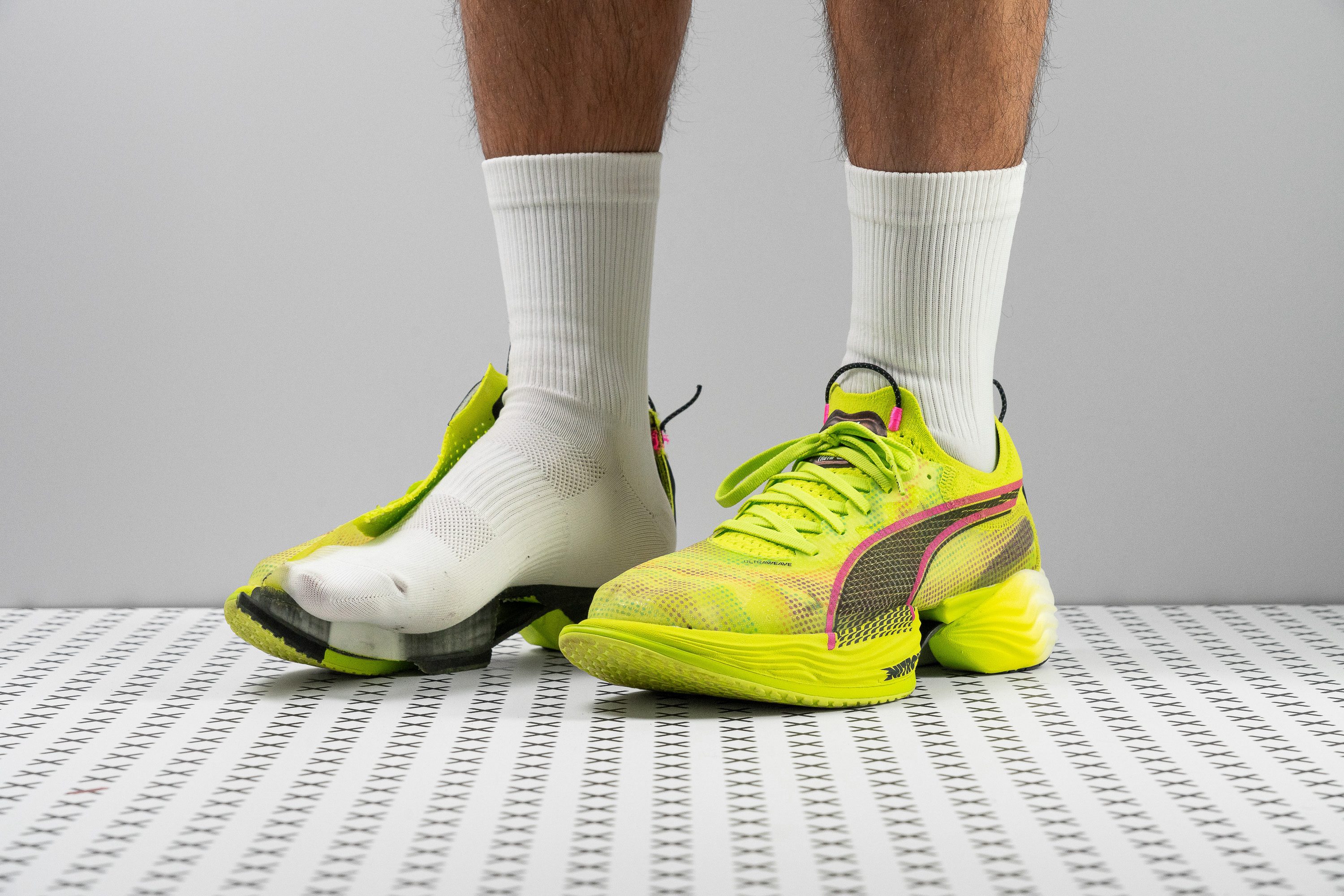Our verdict
- Our top pick in best PUMA running shoes
Pros
- Enhanced energy return
- Ultra-breathable upper
- Exceptional grip
- Max race-day legal stack
- Highly responsive
- Works for all footstrikes
- Great for marathons
Cons
- Excessively heavy
- Odd-feeling decoupled heel
- Pricier than most supershoes
Audience verdict
Comparison
The most similar running shoes compared
+ + Add a shoe | |||||
|---|---|---|---|---|---|
| Audience score | 80 Decent! | 90 Great! | 87 Good! | 89 Great! | |
| Price | $260 | $275 | $250 | $250 | |
| Pace | CompetitionSpeed training | Competition | Competition | Competition | |
| Arch support | Neutral | Neutral | Neutral | Neutral | |
| Weight lab Weight brand | 9.3 oz / 264g 9 oz / 255g | 7.2 oz / 203g 7.2 oz / 204g | 7.7 oz / 218g 7.9 oz / 224g | 7.7 oz / 218g 7.9 oz / 223g | |
| Lightweight | ✗ | ✓ | ✓ | ✓ | |
| Drop lab Drop brand | 7.8 mm 8.0 mm | 8.0 mm 8.0 mm | 6.6 mm 5.0 mm | 8.0 mm 6.5 mm | |
| Strike pattern | Mid/forefoot | HeelMid/forefoot | Mid/forefoot | HeelMid/forefoot | |
| Midsole softness | Soft | Soft | Soft | Balanced | |
| Difference in midsole softness in cold | Small | Small | Small | Small | |
| Toebox durability | Bad | Bad | Bad | Bad | |
| Heel padding durability | Good | Good | Good | Good | |
| Outsole durability | Decent | Good | Good | Good | |
| Breathability | Breathable | Breathable | Moderate | Breathable | |
| Toebox width at the widest part | Medium | Medium | Narrow | Medium | |
| Toebox width at the big toe | Narrow | Medium | Narrow | Medium | |
| Stiffness | Stiff | Stiff | Stiff | Stiff | |
| Difference in stiffness in cold | Small | Small | Small | Small | |
| Torsional rigidity | Stiff | Stiff | Stiff | Stiff | |
| Heel counter stiffness | Flexible | Flexible | Flexible | Flexible | |
| Plate | Carbon plate | Carbon plate | Carbon plate | Carbon plate | |
| Rocker | ✗ | ✓ | ✓ | ✓ | |
| Heel lab Heel brand | 39.7 mm 40.0 mm | 39.9 mm 40.0 mm | 37.7 mm 36.0 mm | 37.8 mm 39.5 mm | |
| Forefoot lab Forefoot brand | 31.9 mm 32.0 mm | 31.9 mm 32.0 mm | 31.1 mm 31.0 mm | 29.8 mm 33.0 mm | |
| Widths available | Normal | Normal | Normal | Normal | |
| Orthotic friendly | ✓ | ✓ | ✓ | ✓ | |
| Season | SummerAll seasons | SummerAll seasons | All seasons | SummerAll seasons | |
| Removable insole | ✓ | ✓ | ✓ | ✓ | |
| Ranking | #241 Bottom 7% | #43 Top 17% | #147 Bottom 43% | #73 Top 29% | |
| Popularity | #261 Top 1% | #32 Top 13% | #144 Bottom 44% | #78 Top 30% |
Who should buy
After testing in the lab the Puma Fast-R Nitro Elite 2, we've discovered that:
- It's a standout choice for those who appreciate a head-turning design without sacrificing performance at races.
- It excels for runners who prioritize excellent traction, as the PUMAGRIP outsole offers world-class grip in all conditions.
- Marathoners looking for an aggressive ride will find this shoe is a blessing with its super-stiff carbon plate.
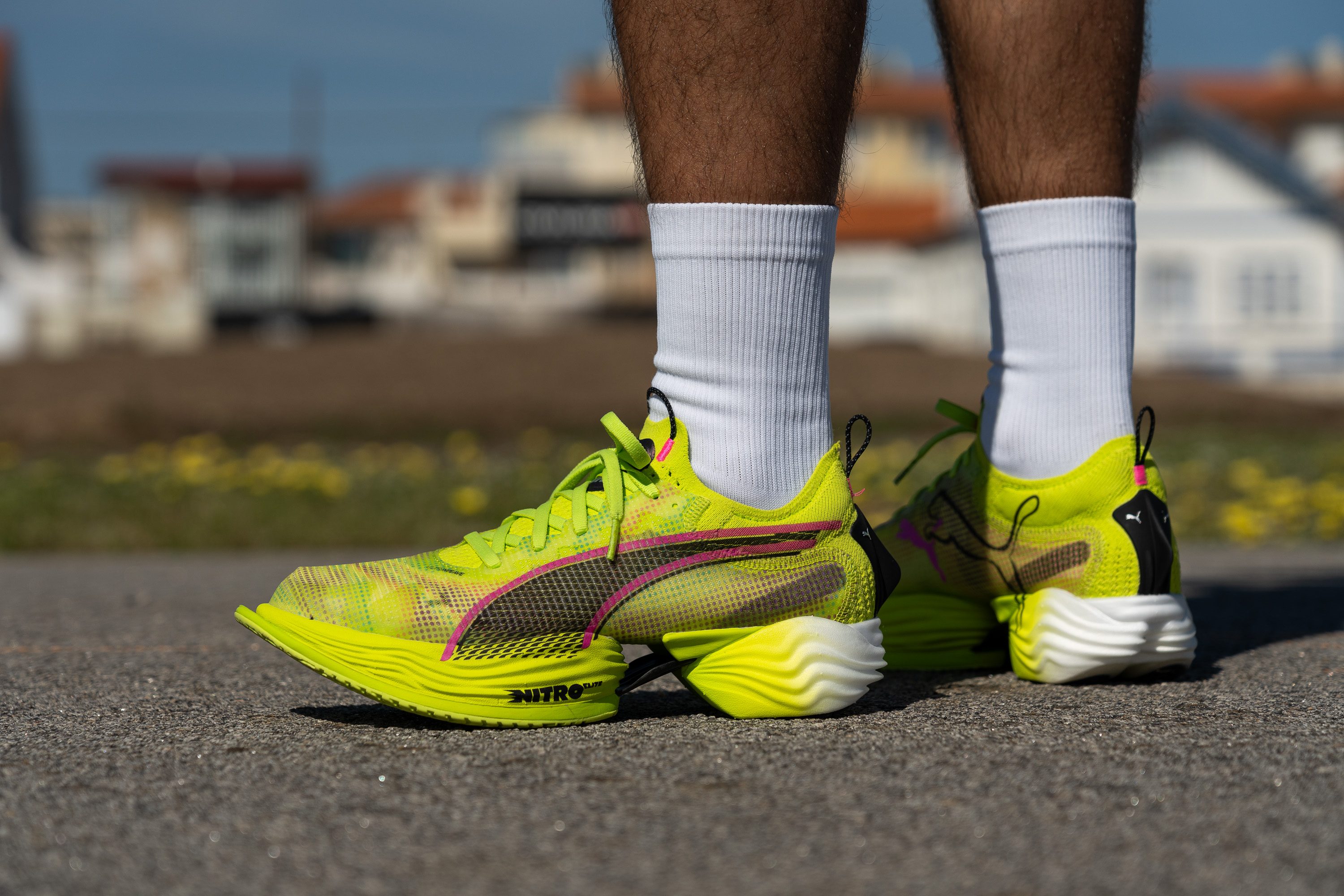
Who should NOT buy
The Fast-R Nitro Elite 2 stands out as Puma's most radical supershoe yet, but we found its weight heavier than desired. For those seeking a lightweight racing shoe, this is not the answer. We recommend considering alternatives like the Nike Vaporfly 3 or the Saucony Endorphin Elite, which offer world-class performance without the extra bulk.
Additionally, we believe the Fast-R Nitro Elite 2 may not provide the stable ride some need. For better support, the Adidas Adizero Adios Pro 3 and Hoka Rocket X 2 are not only lighter and more affordable, but they also offer a more stable ride.
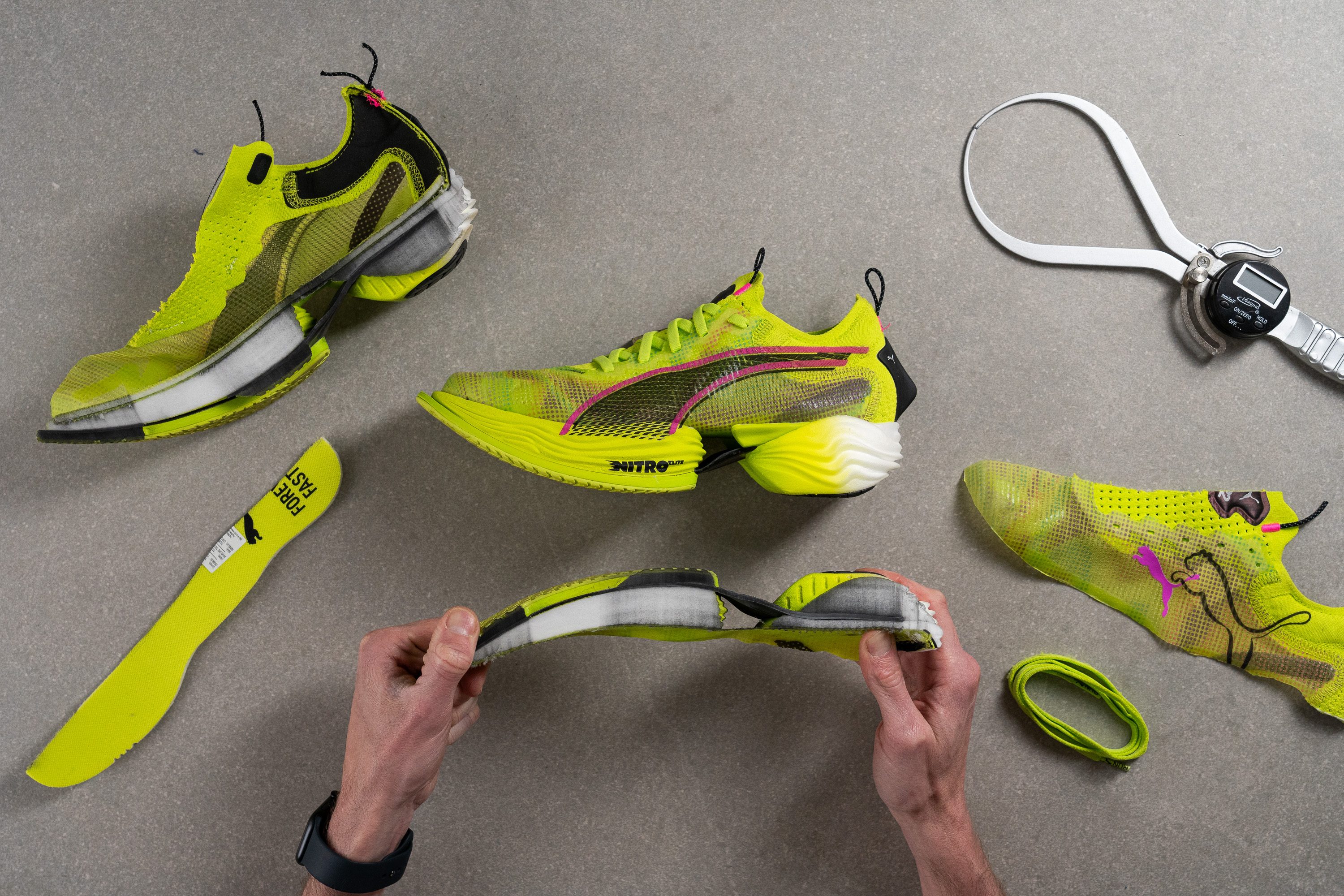
Breathability
Proper ventilation is crucial in any racing shoe, and the Ultraweave upper of this shoe appears highly breathable at first sight. Is it really? Let's find out in the lab.
Our initial test, involving smoke to trace airflow, is crucial. Fortunately, it confirmed excellent airflow, earning the Fast-R Nitro Elite 2 a perfect 5/5 on our scale.
Puma achieved this with an ultra-thin engineered mesh, clearly visible as we moved the upper over our light. We've encountered only a few uppers thinner than this one, and impressively, this airiness extends even to the heel, ensuring comfort for the entire foot, although that will impact stability in a negative way.
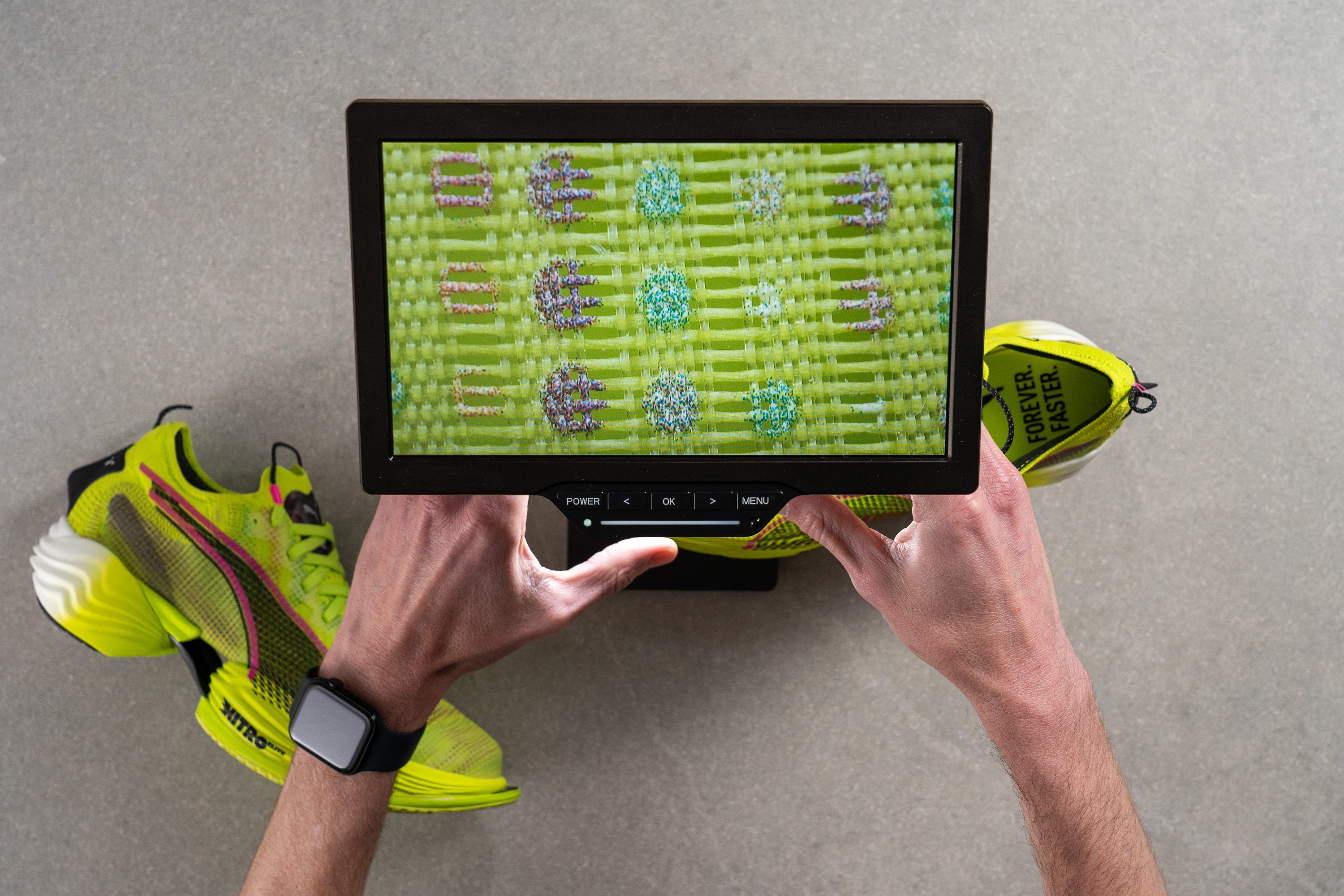
Next, we examined the Ultraweave upper under the microscope to understand its unique structure. Despite lacking visible ventilation holes, air flows effortlessly thanks to micro-holes naturally present in the mesh.
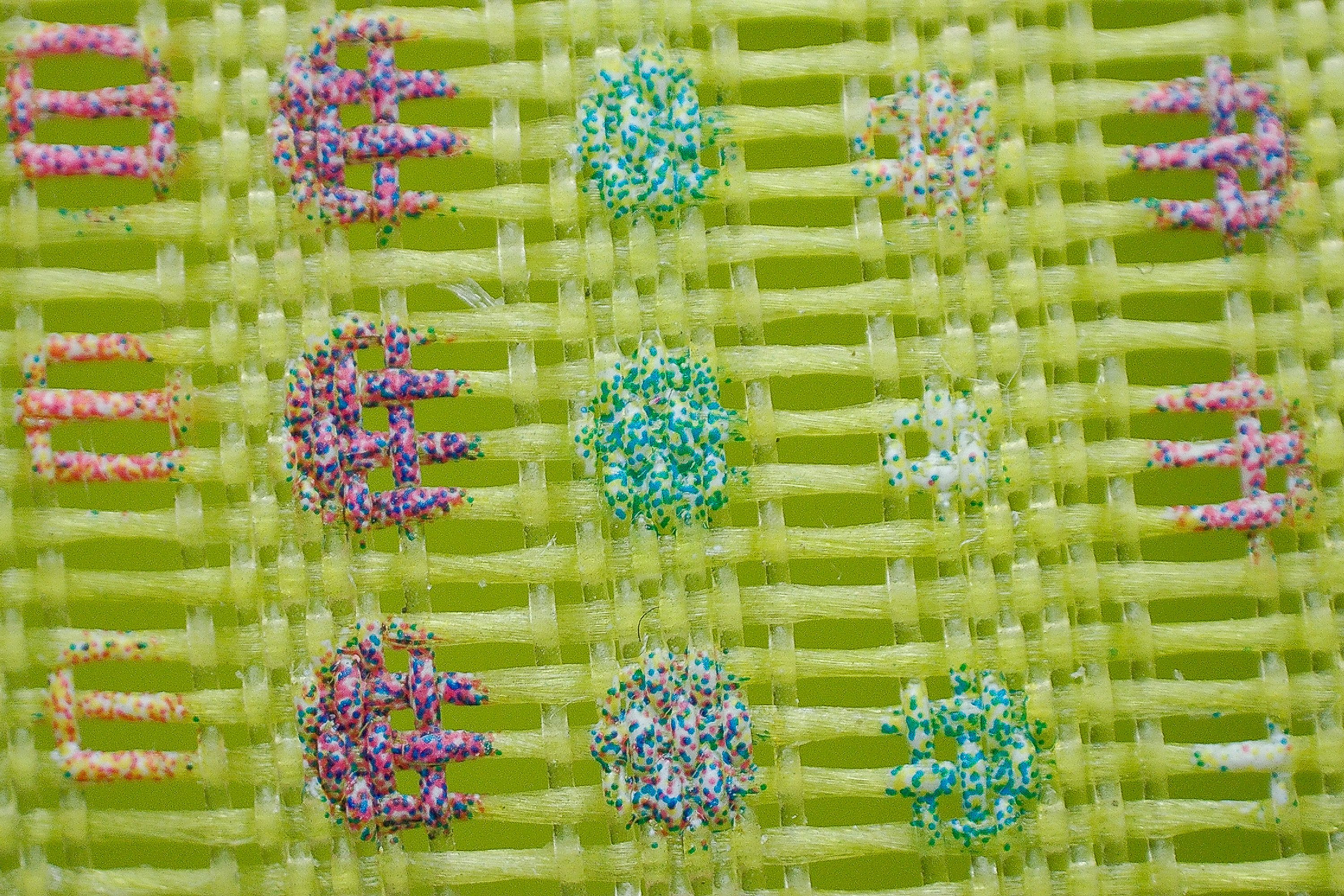
Finally, a manual examination confirmed the upper is not stretchy and has minimal padding—just what we expect from a shoe designed for race day!
| Puma Fast-R Nitro Elite 2 | 5 |
| Average | 3.8 |
Durability
Toebox durability
We've already established that the Fast-R Nitro Elite 2 offers exceptional ventilation, but this comes at the cost of using very thin materials. And this raised our concerns about its durability.
Indeed, after conducting our first Dremel test, we confirmed our initial suspicions—the upper's durability is severely lacking, leading us to rate it a mere 1/5.
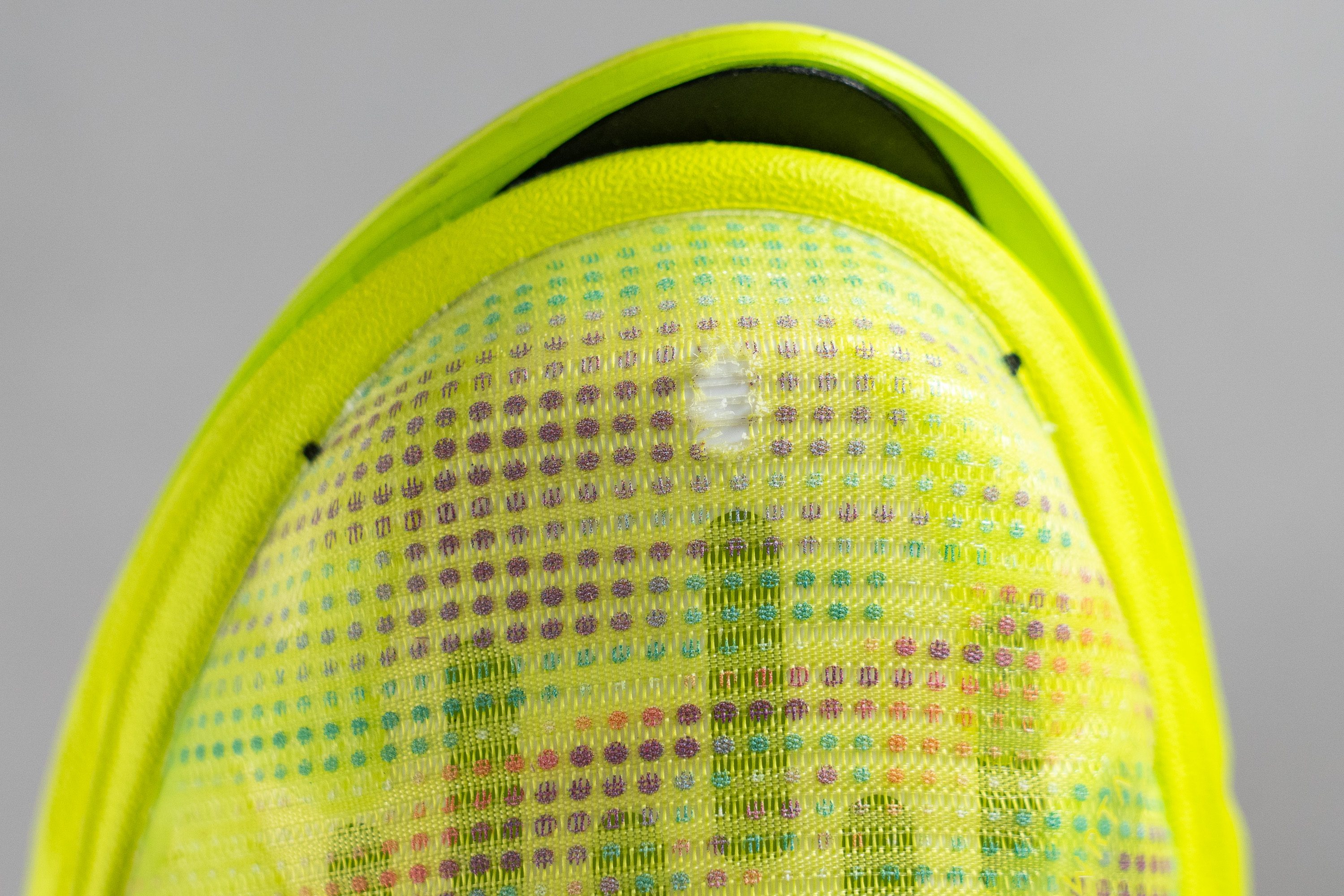
| Puma Fast-R Nitro Elite 2 | 1 |
| Average | 2.5 |
Heel padding durability
We flipped the Fast-R to test the heel padding, hopeful for a better result.
And we were thrilled with the outcome! The heel padding not only performed better but achieved a perfect score of 5/5. This ensures that no matter how much you race and train in these shoes, the heel padding will withstand the wear and tear.
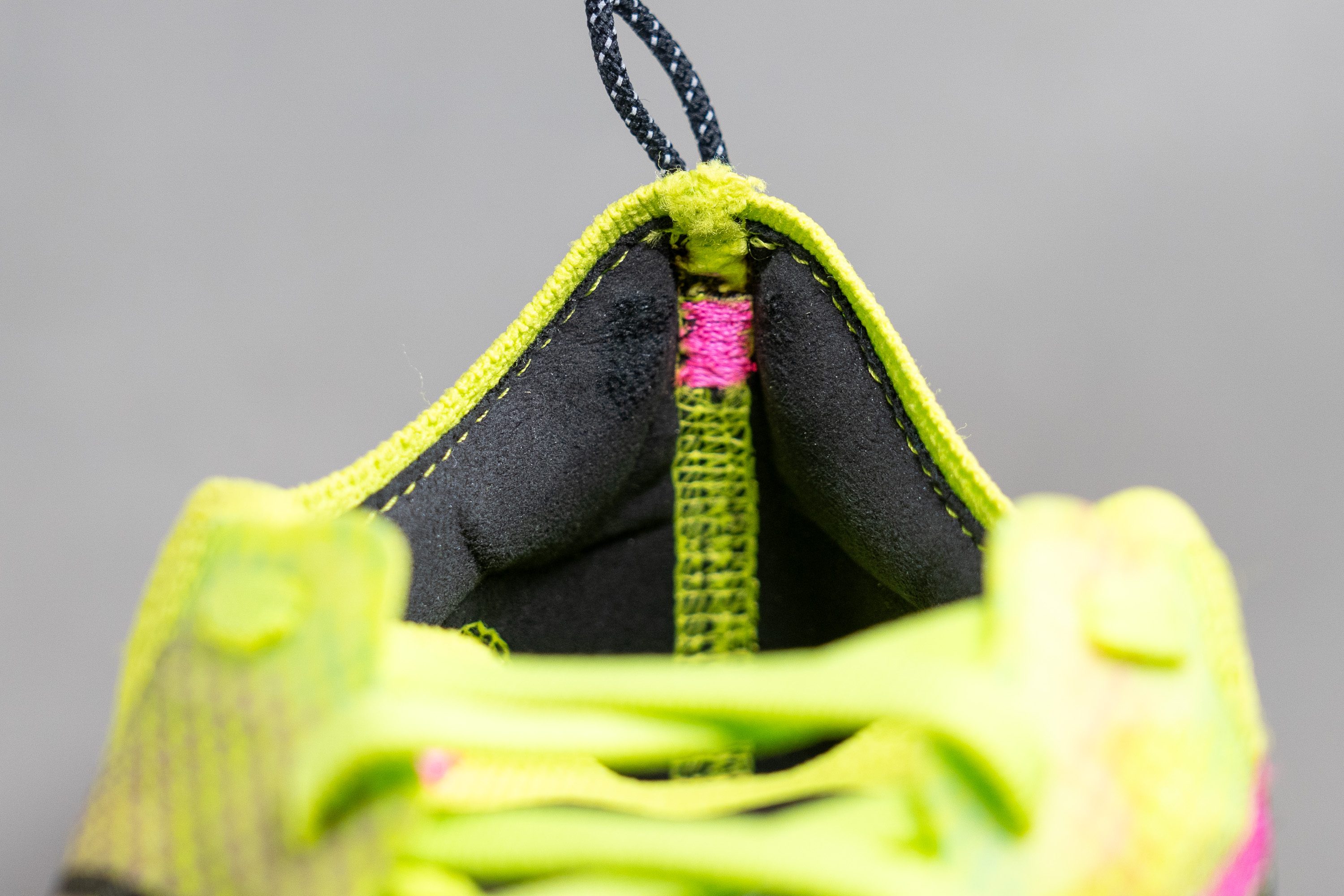
| Puma Fast-R Nitro Elite 2 | 5 |
| Average | 3.3 |
Outsole hardness
We've moved on from the upper and now it's time to assess the outsole. Given its steep, 260-bucks price, we expected that the Fast-R Nitro Elite 2 was going to feature PUMAGRIP—Puma's most advanced rubber technology. And here it is.
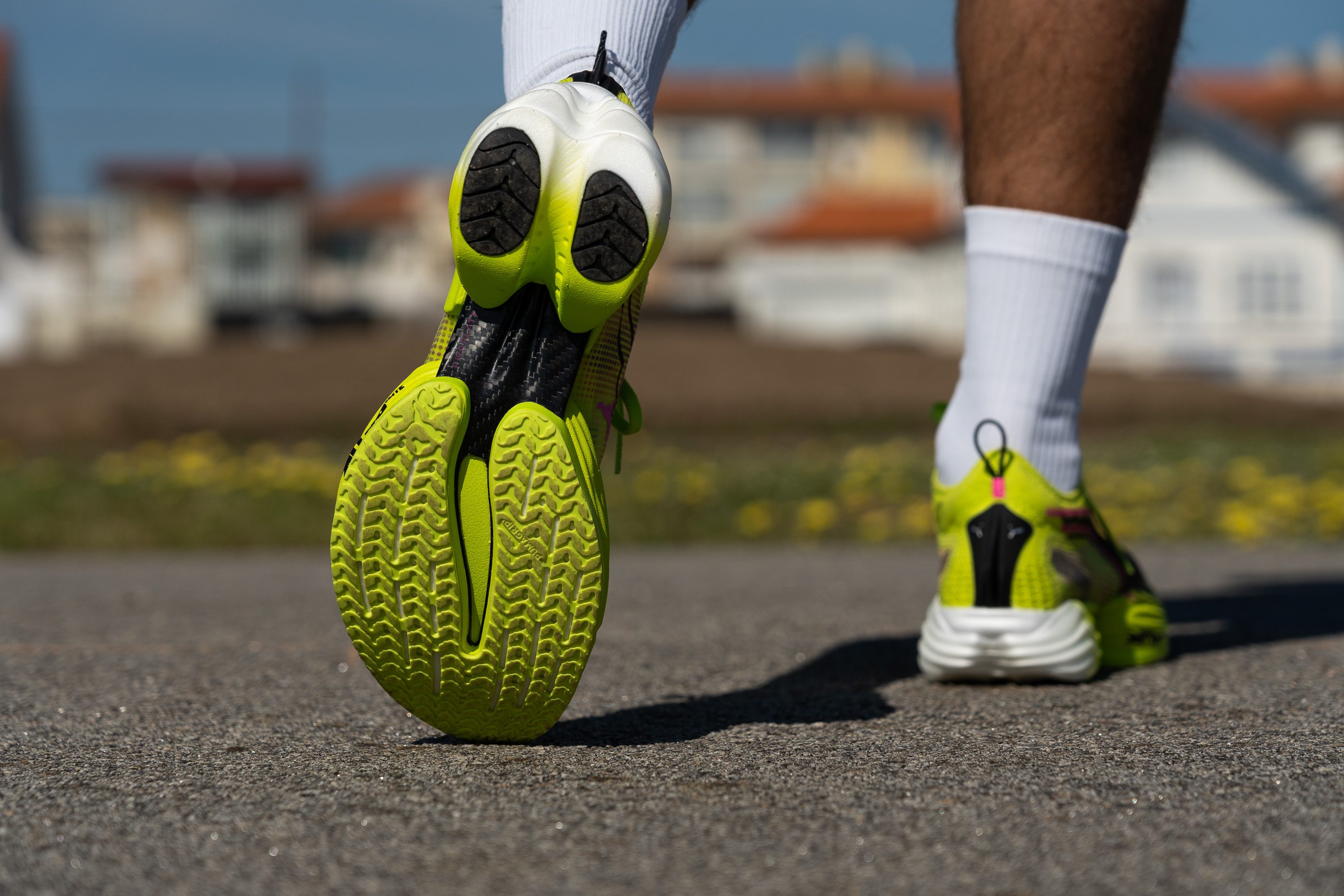
With a hardness score of 74.0 HC, the formula closely mirrors that of the Puma Deviate Nitro Elite 2, which we found also provided exceptional grip, undoubtedly one of the best in the industry.
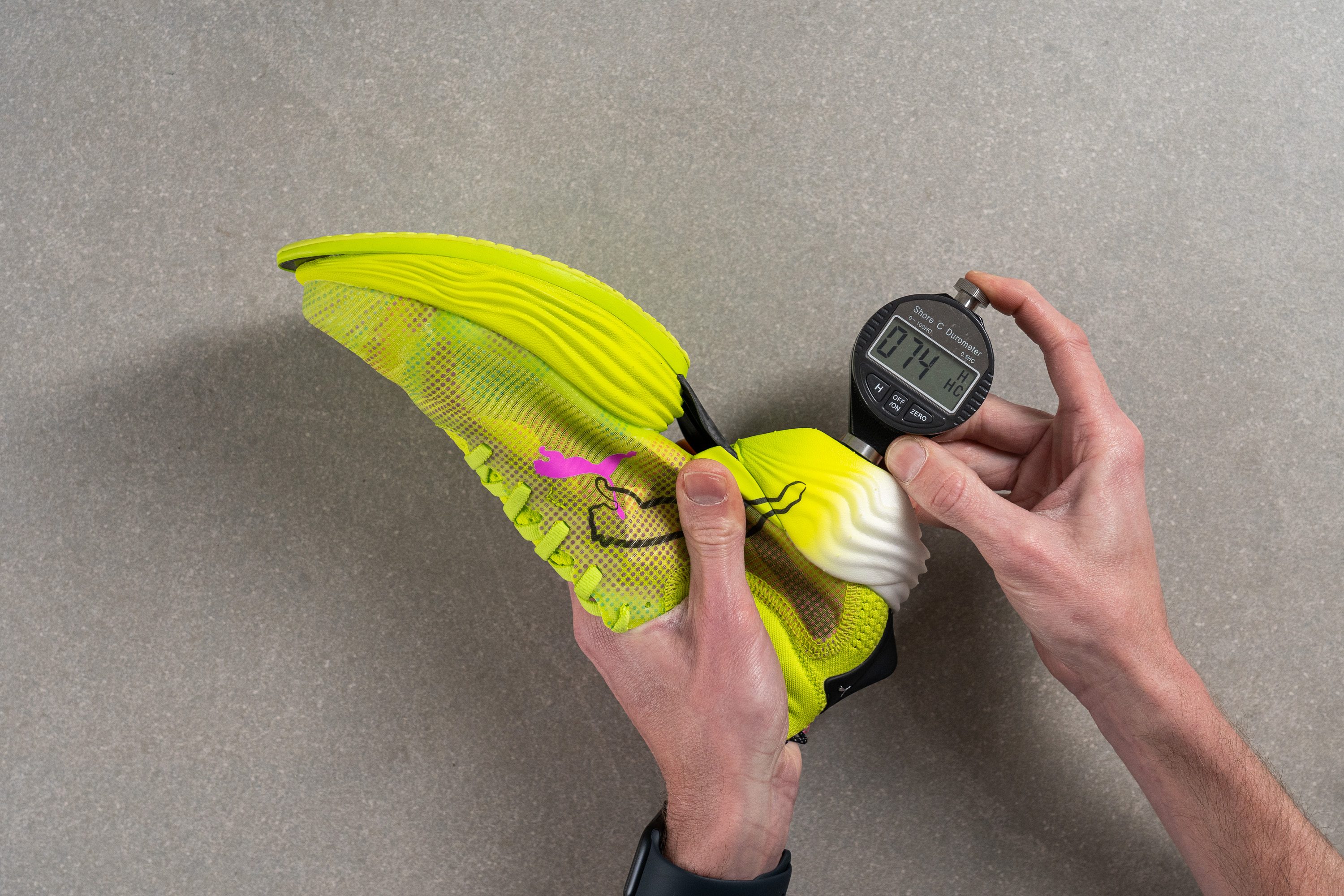
| Puma Fast-R Nitro Elite 2 | 74.0 HC |
| Average | 80.1 HC |
Outsole durability
To evaluate the durability of the PUMAGRIP rubber, we ramped up the Dremel to 10,000 RPM for a third test.
We then measured the indentation in the outsole and found a 1.0 mm gap. Considering the softness of the rubber, this is a good result.
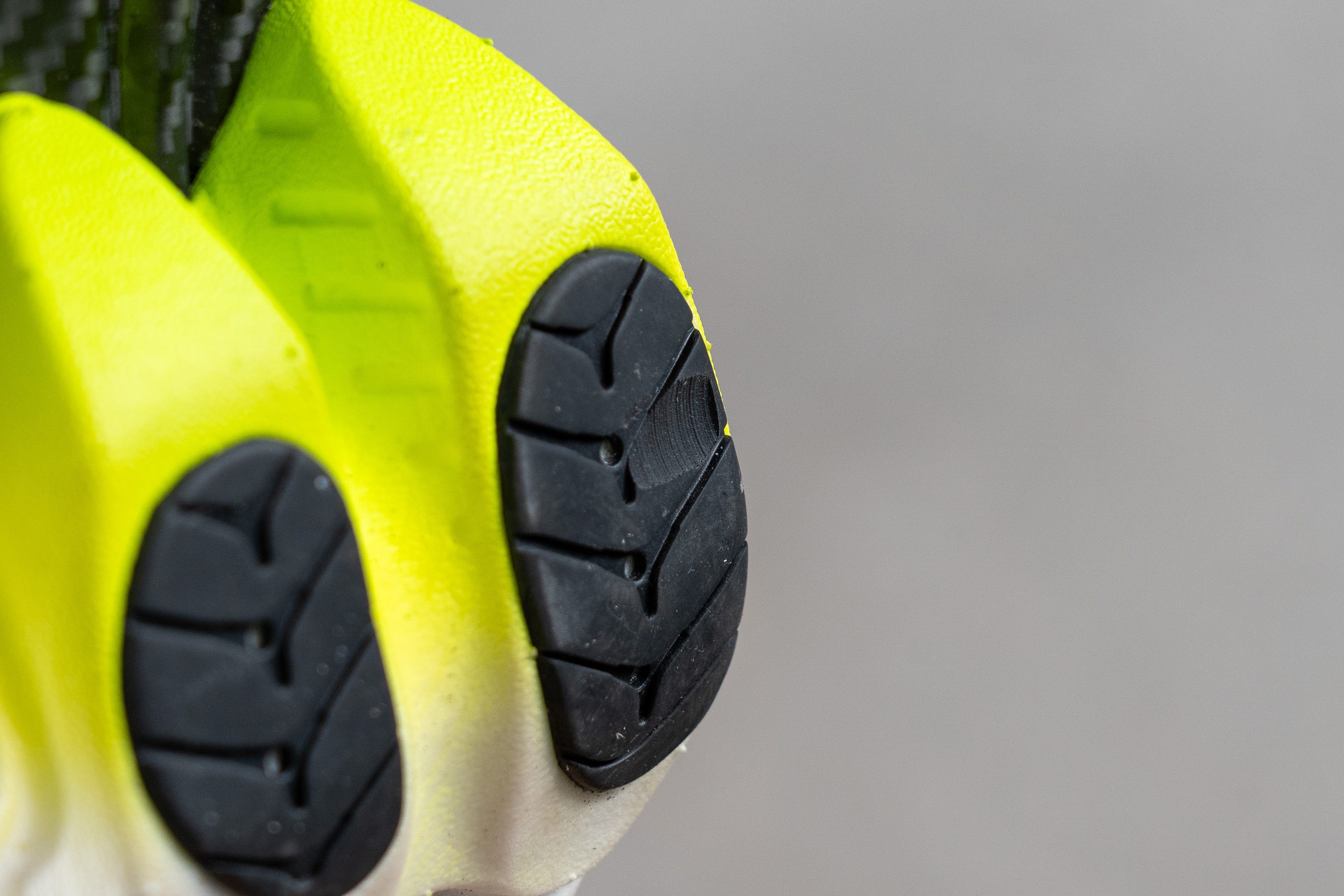
| Puma Fast-R Nitro Elite 2 | 1.0 mm |
| Average | 0.9 mm |
Outsole thickness
We measured the outsole thickness with our vernier caliper and were surprised to find a substantial 3.0mm of rubber.
This is quite impressive for a marathon shoe and might contribute to a heavier weight. However, for those who value durability in a supershoe, this is certainly welcome news.
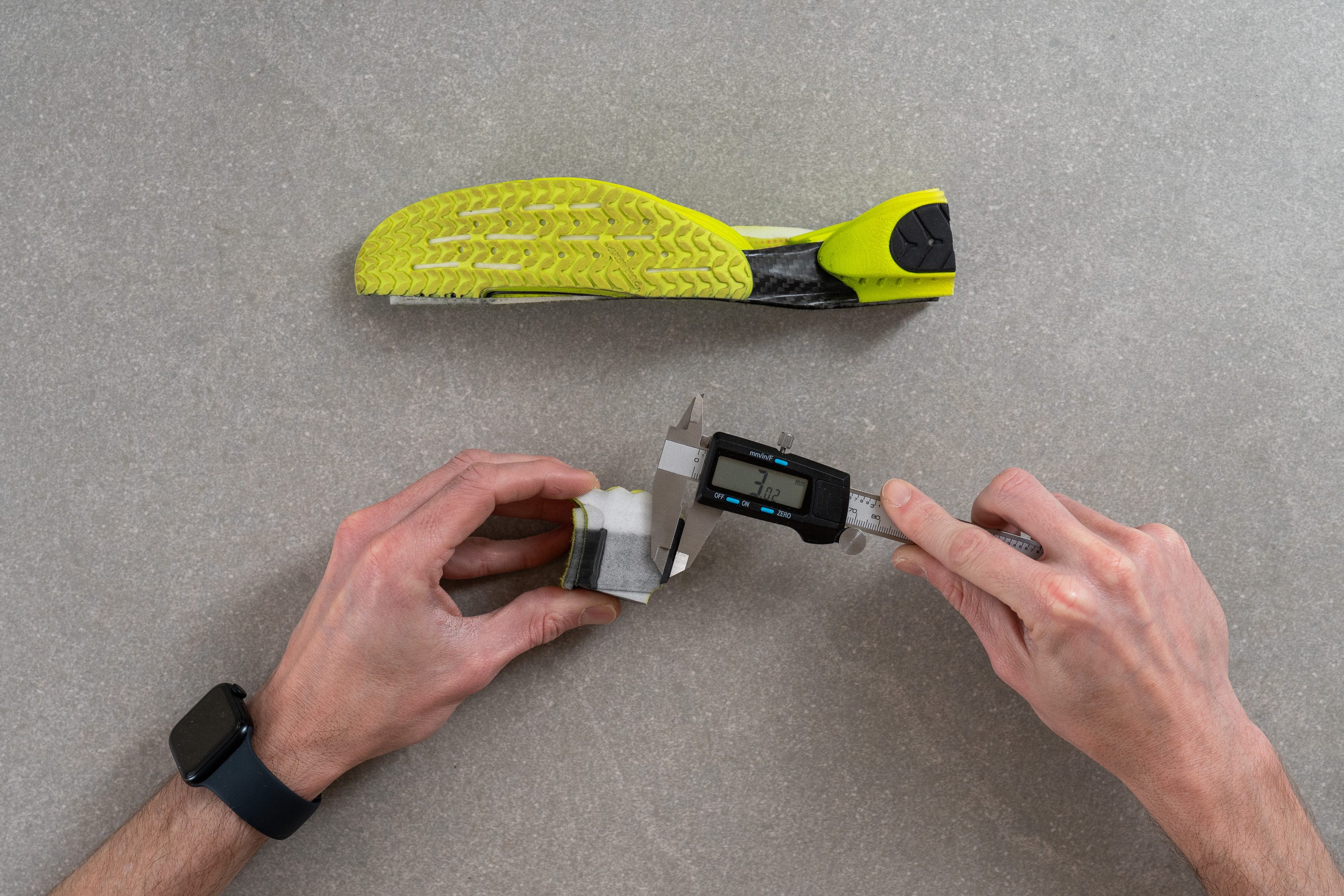
| Puma Fast-R Nitro Elite 2 | 3.0 mm |
| Average | 3.2 mm |
Weight
We've already expressed concerns in previous tests about the weight of this shoe, noting its heft during our runs. And the scale confirms our suspicions.
At 9.3 oz or 264g, that's HEAVY for racing. We suggest this model only if the extra weight isn't a deal-breaker for you.
In fact, apart from the Cielo X1 from Hoka, top-tier supershoes like the Nike Alphafly 3—which sports a similar design and stack height—are significantly lighter, weighing just 7.1 oz or 201g on our scale.
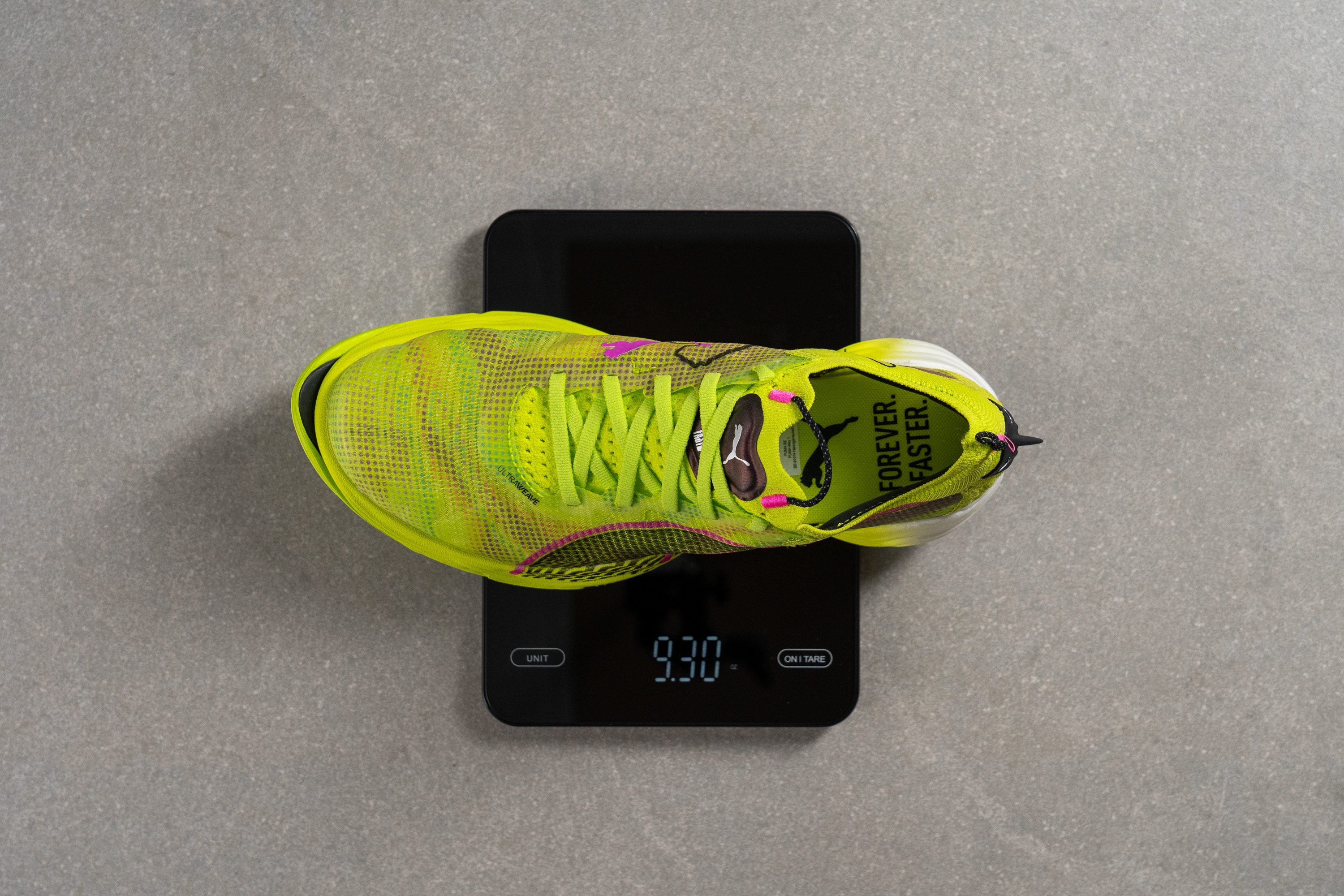
| Puma Fast-R Nitro Elite 2 | 9.31 oz (264g) |
| Average | 9.35 oz (265g) |
Cushioning
Heel stack
While the Fast-R Nitro Elite 2 is on the heavier side, it effectively maximizes its dimensions to the 40-mm heel limit set by World Athletics, packing as much cushioning as possible. We measured the heel stack at an impressive 39.7 mm.
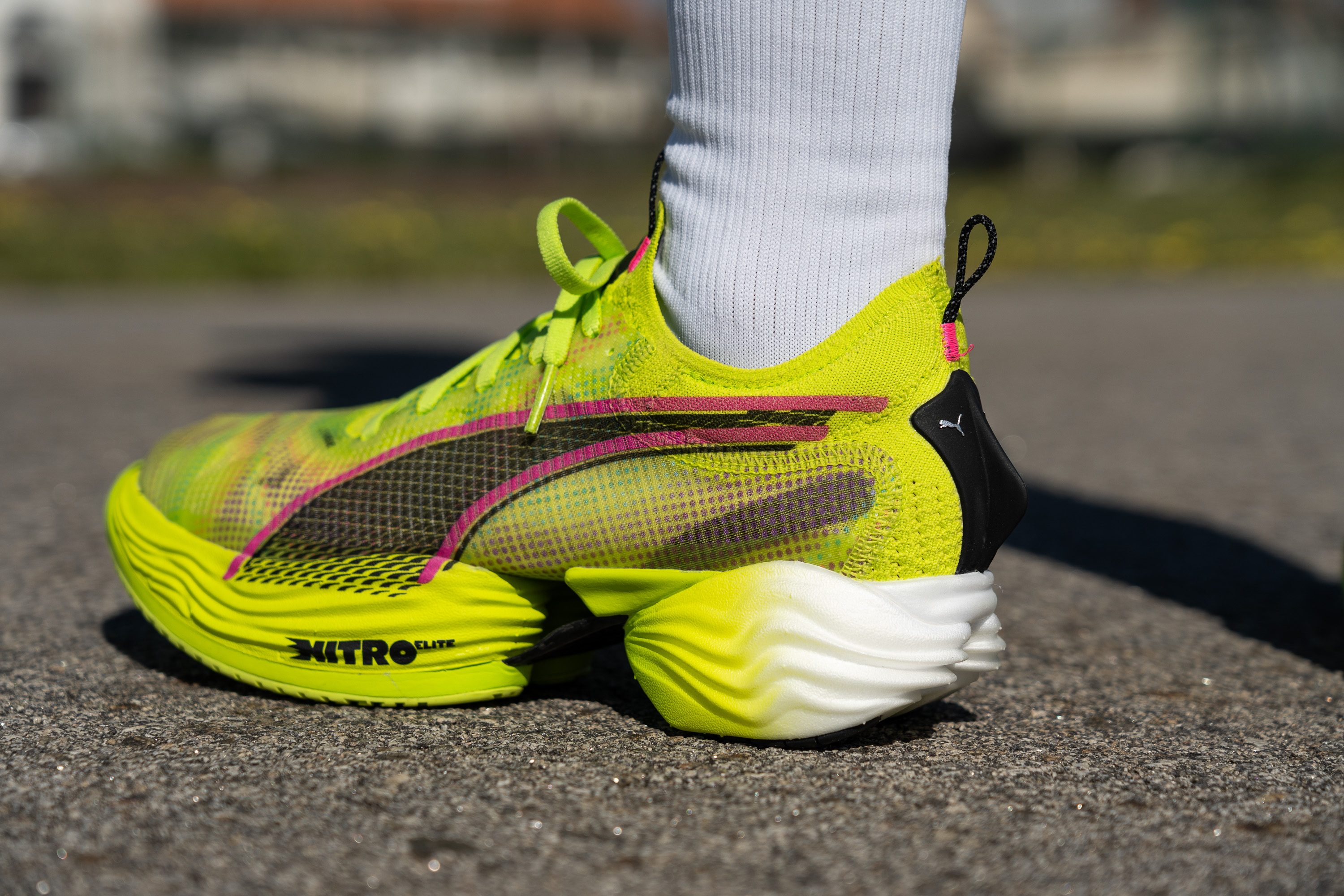
This is particularly beneficial for heavier heel strikers seeking a shoe that can comfortably support their weight over the full 26.2 miles of a marathon.
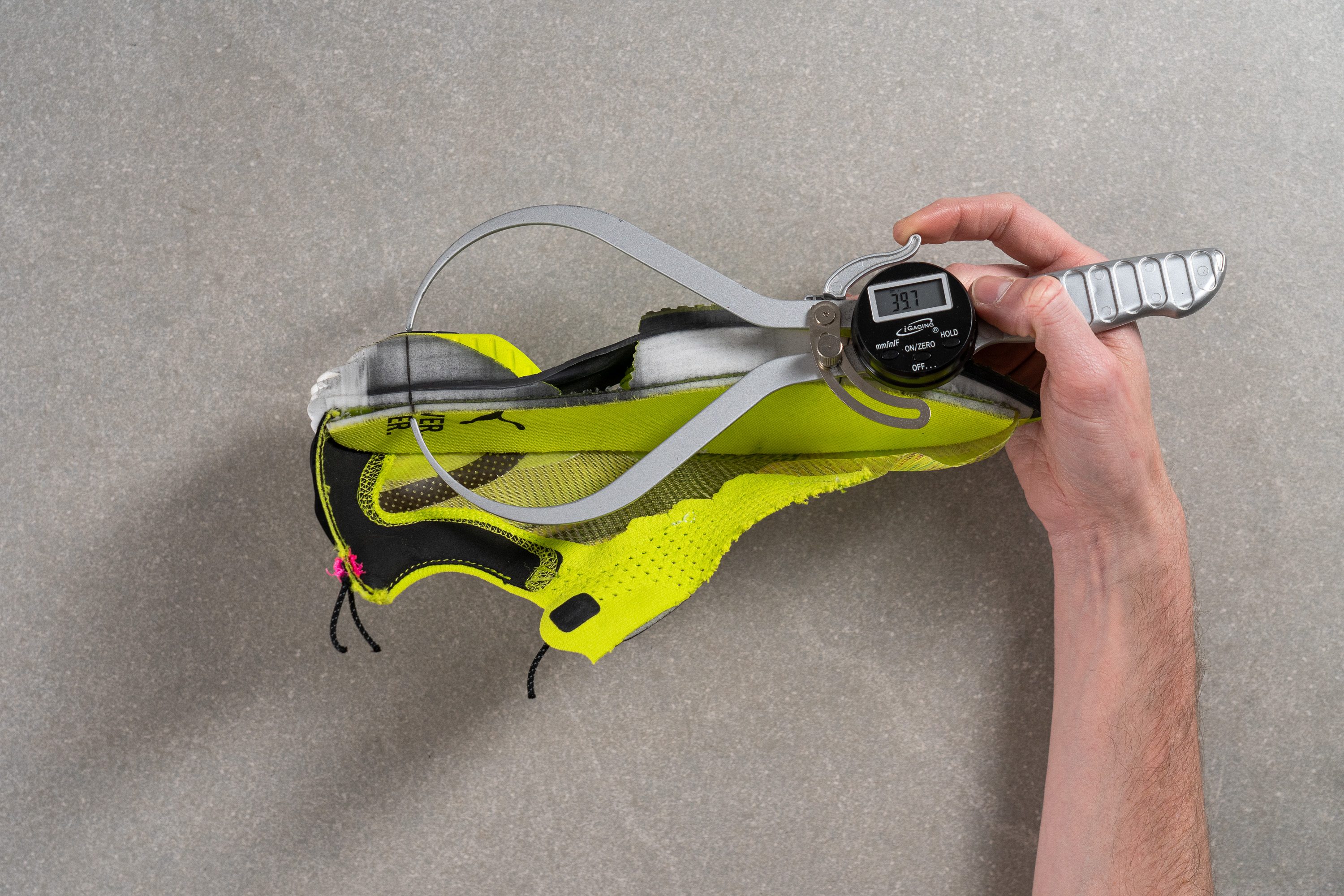
| Puma Fast-R Nitro Elite 2 | 39.7 mm |
| Average | 33.9 mm |
Forefoot stack
The forefoot cushioning measured at 31.9 mm, ranking it among the tallest supershoes we've analyzed in the lab.
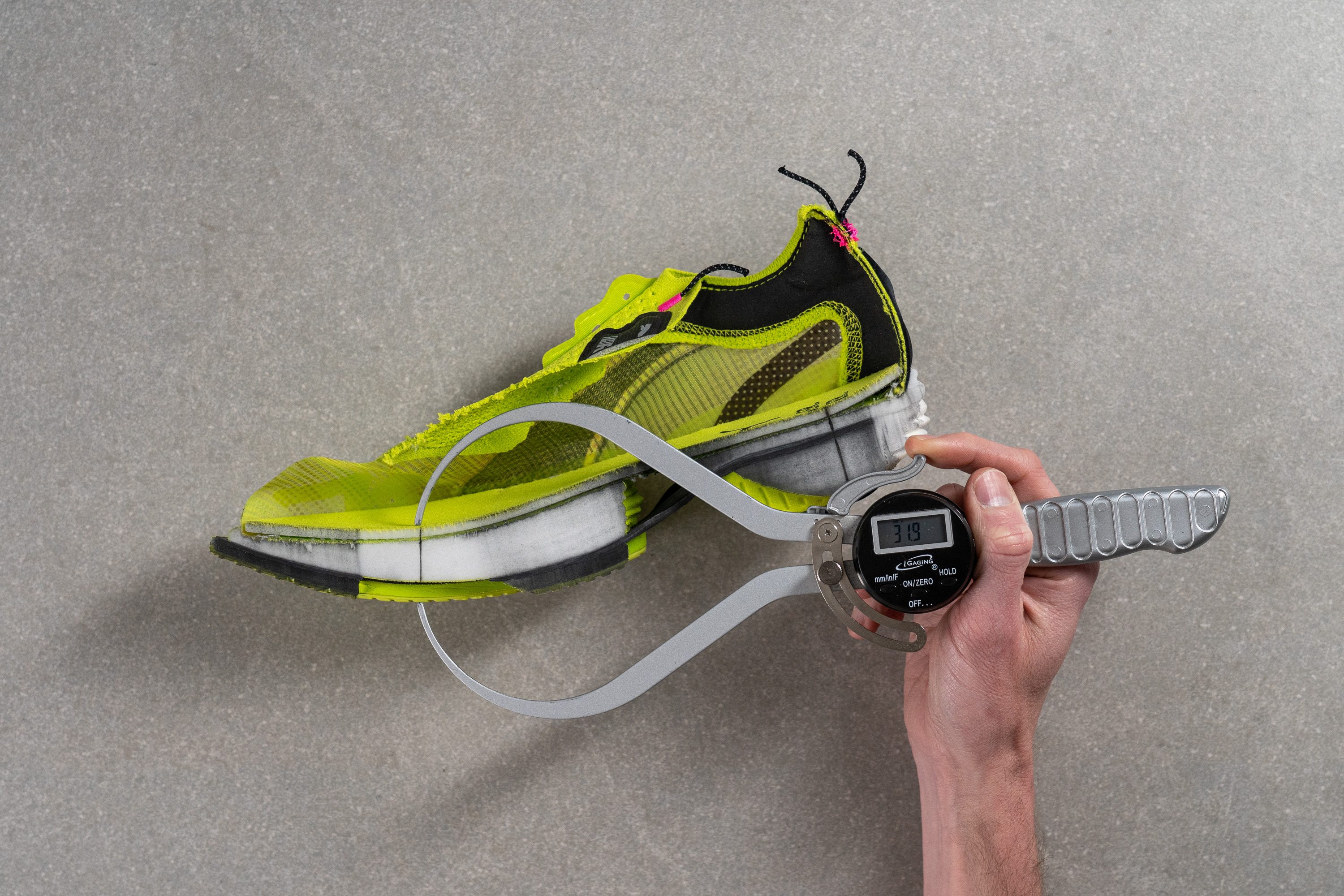
| Puma Fast-R Nitro Elite 2 | 31.9 mm |
| Average | 25.3 mm |
Drop
Following our initial measurements, we calculated a 7.8-mm heel-to-toe drop, closely aligning with Puma's stated 8-mm drop.
We're pleased with this accuracy—discrepancies with brands are typically more pronounced! Additionally, the 8-mm offset makes this shoe versatile, suitable for nearly every type of footstrike.
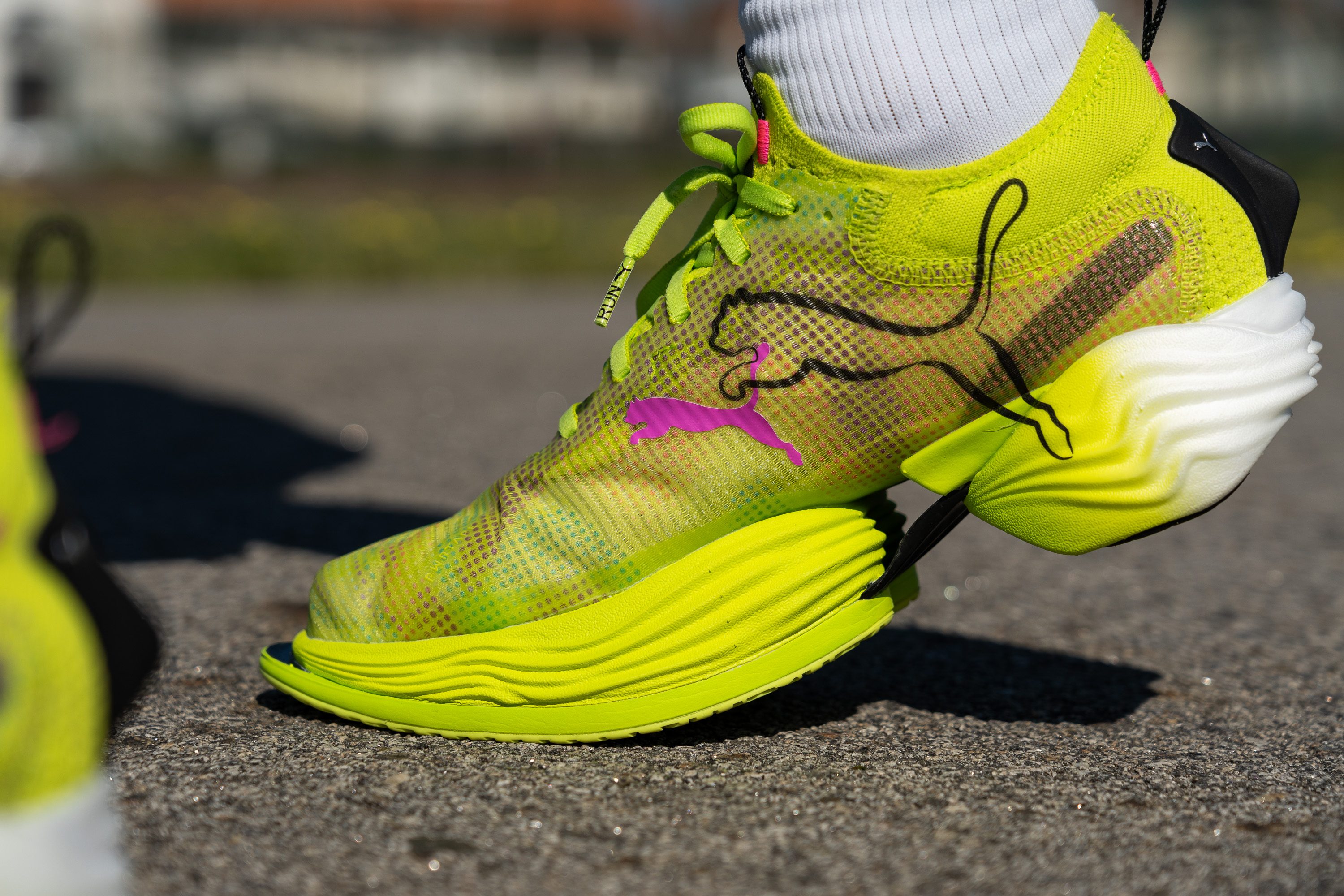
| Puma Fast-R Nitro Elite 2 | 7.8 mm |
| Average | 8.6 mm |
Insole thickness
The insole, while comparable in thickness to average running shoes, was a surprising find for us—competition shoes typically feature thinner footbeds.
Why does this matter? Well, installing a 4.3-mm insole, as found here, within a shoe restricted to a 40-mm overall stack height results in a loss of 2 or 3 mm of foam. This could have been allocated to high-energy-return, Nitro Elite instead.
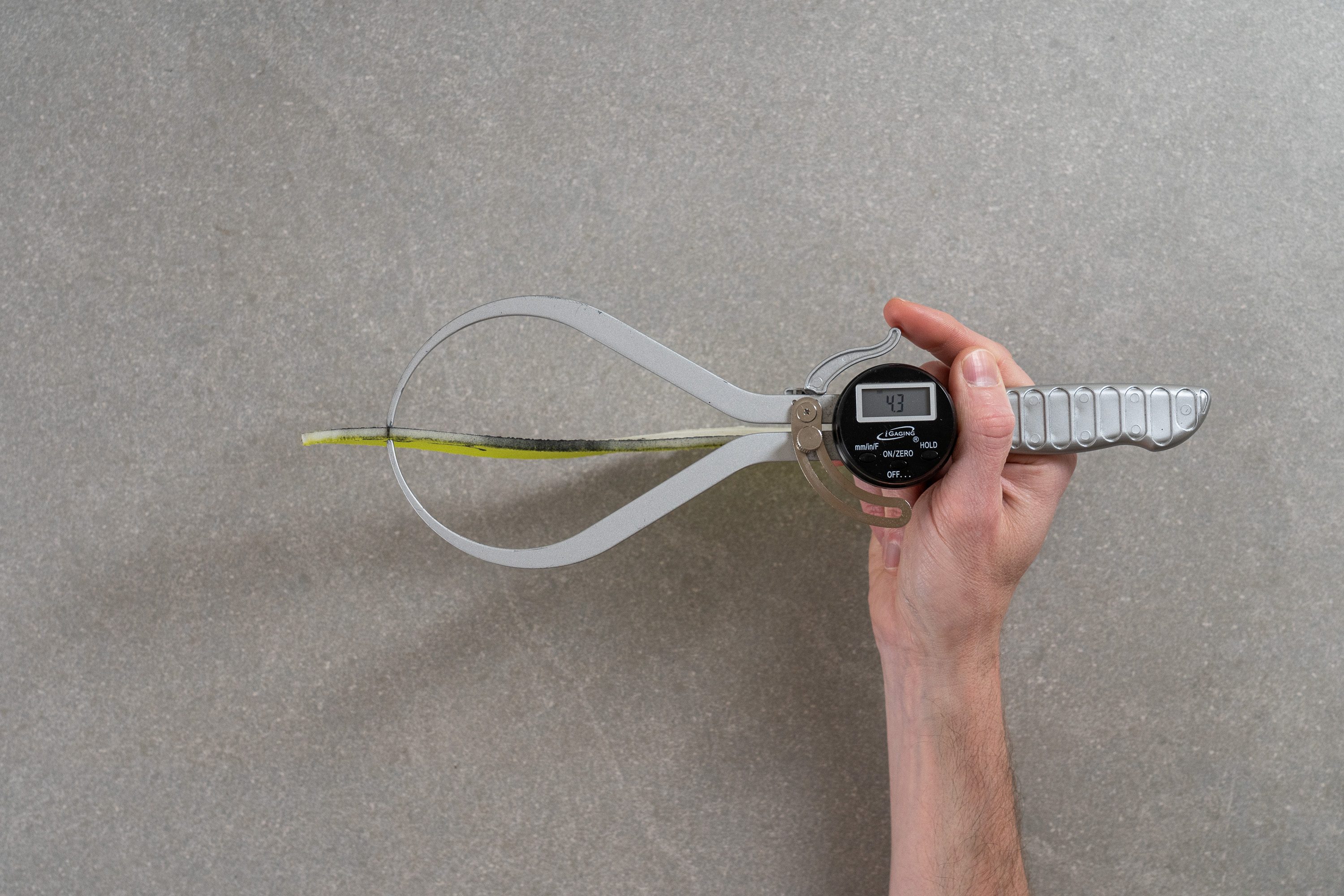
| Puma Fast-R Nitro Elite 2 | 4.3 mm |
| Average | 4.4 mm |
Midsole softness
Speaking of energy return, we discovered the expected material in the midsole: Nitro Elite.
It's Puma's premier foam, known for its substantial energy return. However, Puma has shifted its formulation from supercritical, nitrogen-injected PEBA to Aliphatic TPU—a first for the brand.
In terms of softness, Puma opted for a balanced approach with a hardness of 19.5 HA. Because of this formulation, we didn't find the experience plush at all, particularly in the forefoot, which we attribute to the ultra-low placement of the carbon-fiber plate.
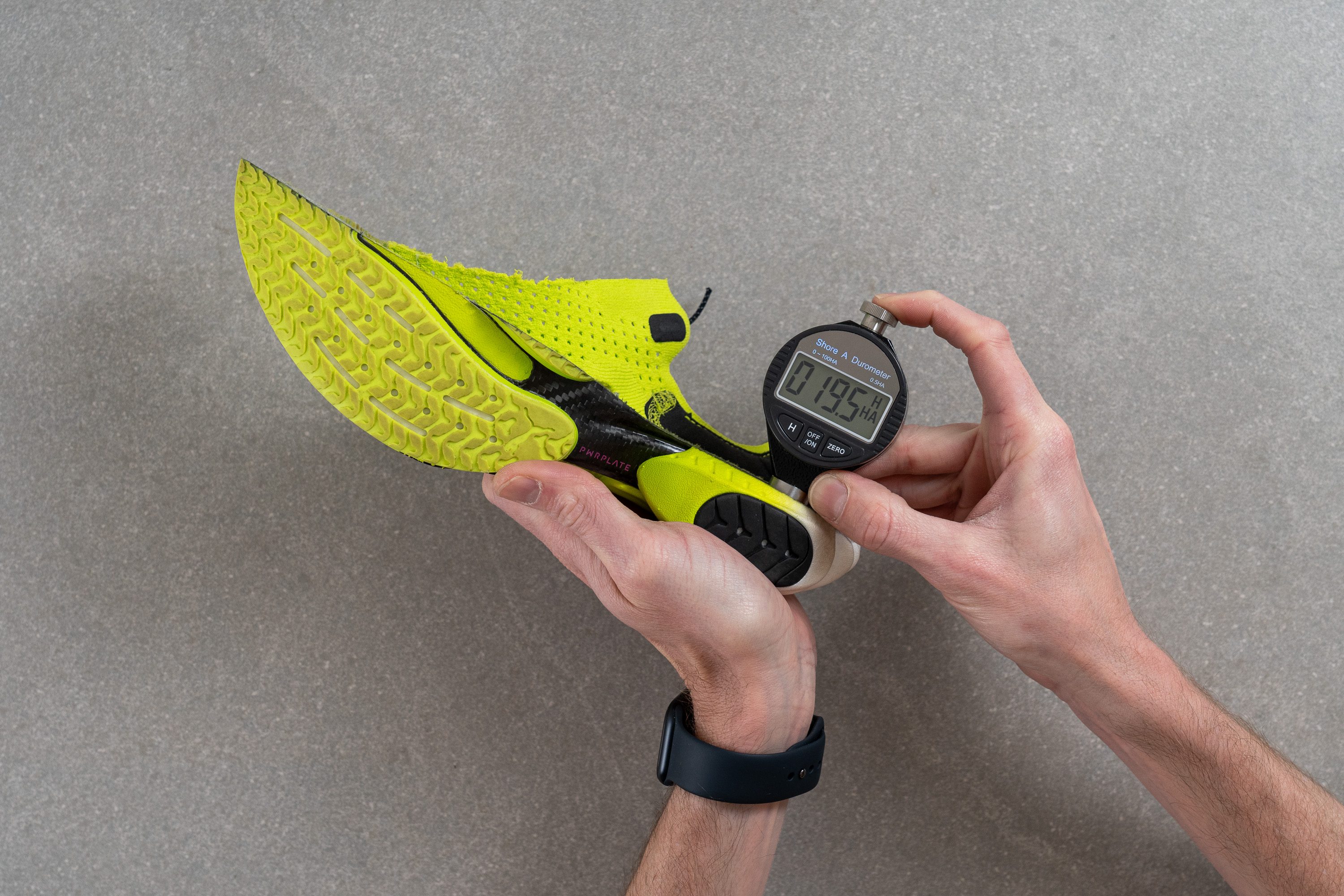
| Puma Fast-R Nitro Elite 2 | 19.5 HA |
| Average | 21.0 HA |
Difference in midsole softness in cold
Given that it's made from TPU, we weren't surprised that the Fast-R Nitro Elite 2 performed exceptionally well in our first freezer challenge. We placed the shoe in the freezer for 20 minutes and then retested its softness, finding only a 9% increase!
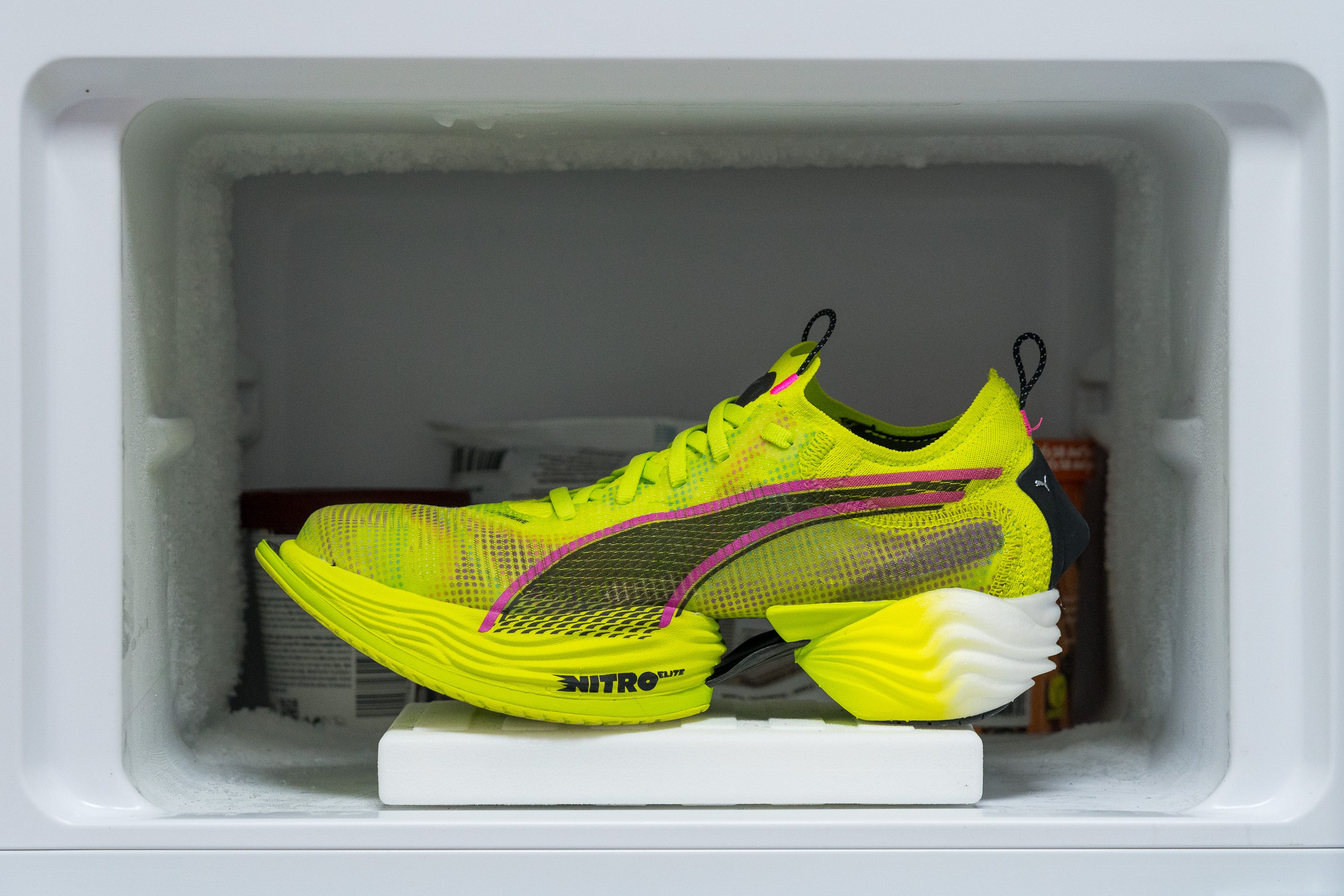
| Puma Fast-R Nitro Elite 2 | 9% |
| Average | 25.2% |
Plate
The standout feature is the PWRPLATE, which is prominently visible throughout the shoe due to the absence of foam in the midfoot, exposing the carbon-fiber plate.
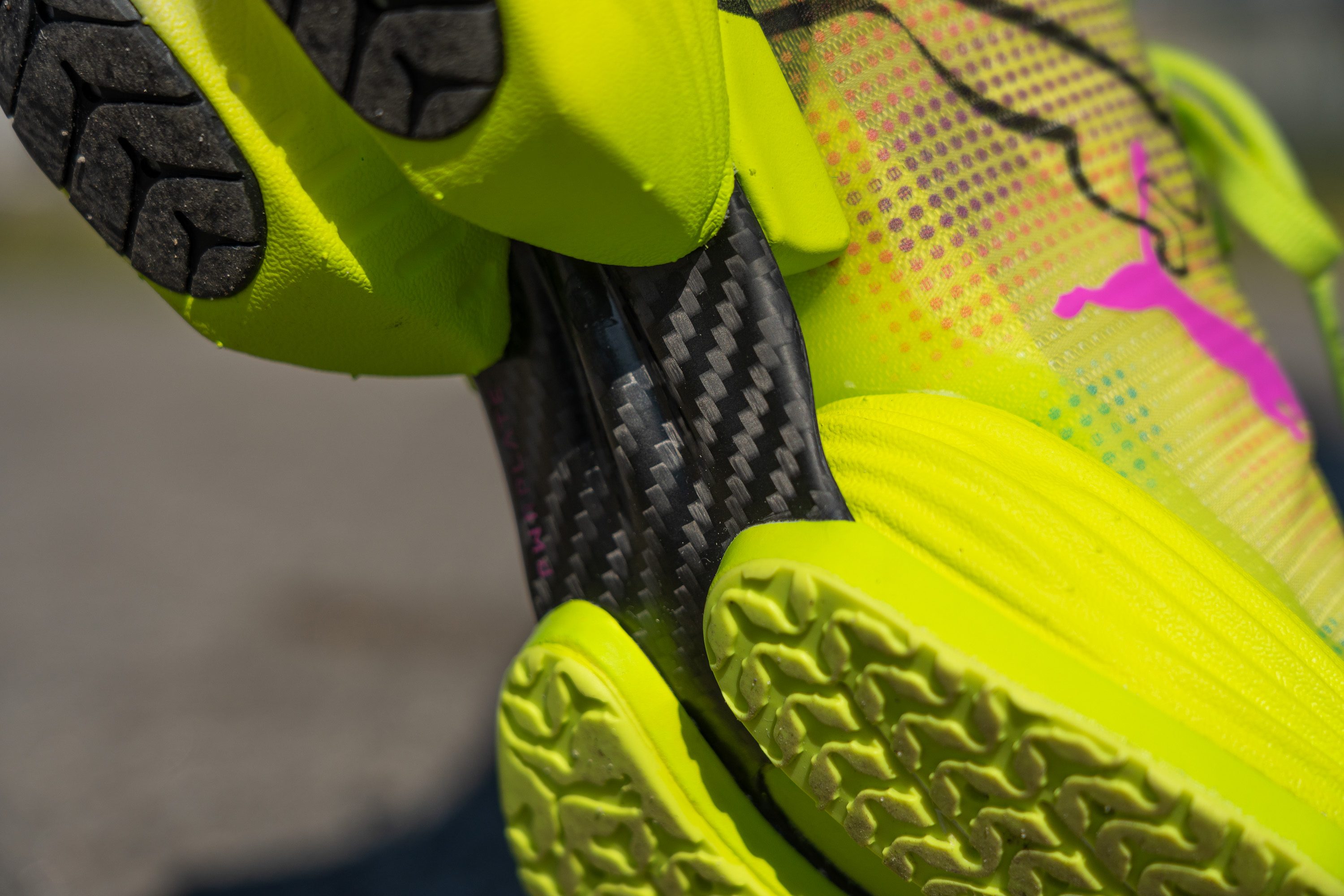
Puma has really gone wild with this design, and the stiffness of the plate reflects that. It may not be suitable for everyone, particularly those looking for a comfortable racing shoe.
In our view, if less stiff feel is a priority, we suggest opting for the comfy ride of the New Balance FuelCell Elite v4 instead.
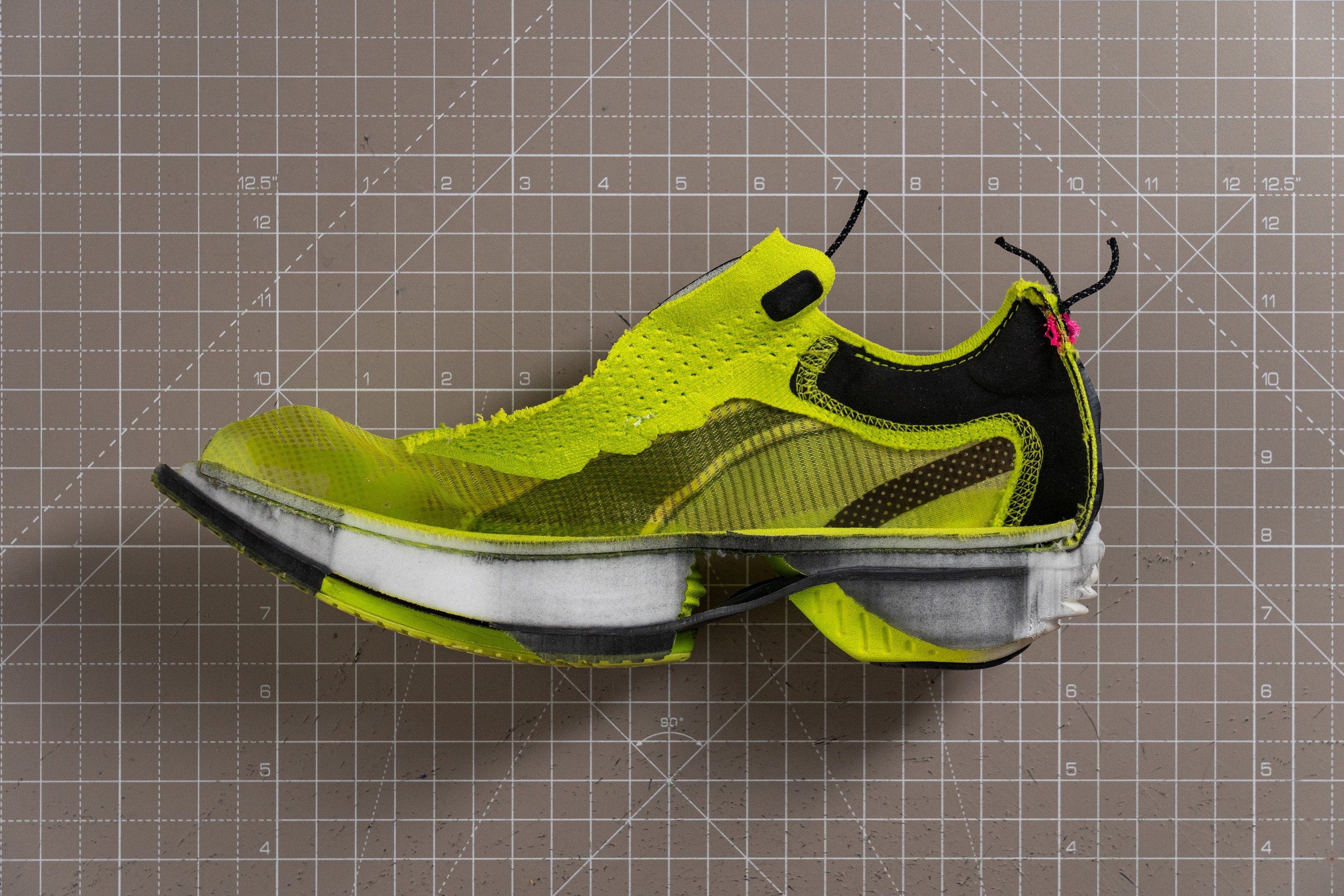
Rocker
Another standout feature of the bizarre design of the Fast-R Nitro Elite 2 is the toe rocker. It begins noticeably early and the plate extends beyond the upper.
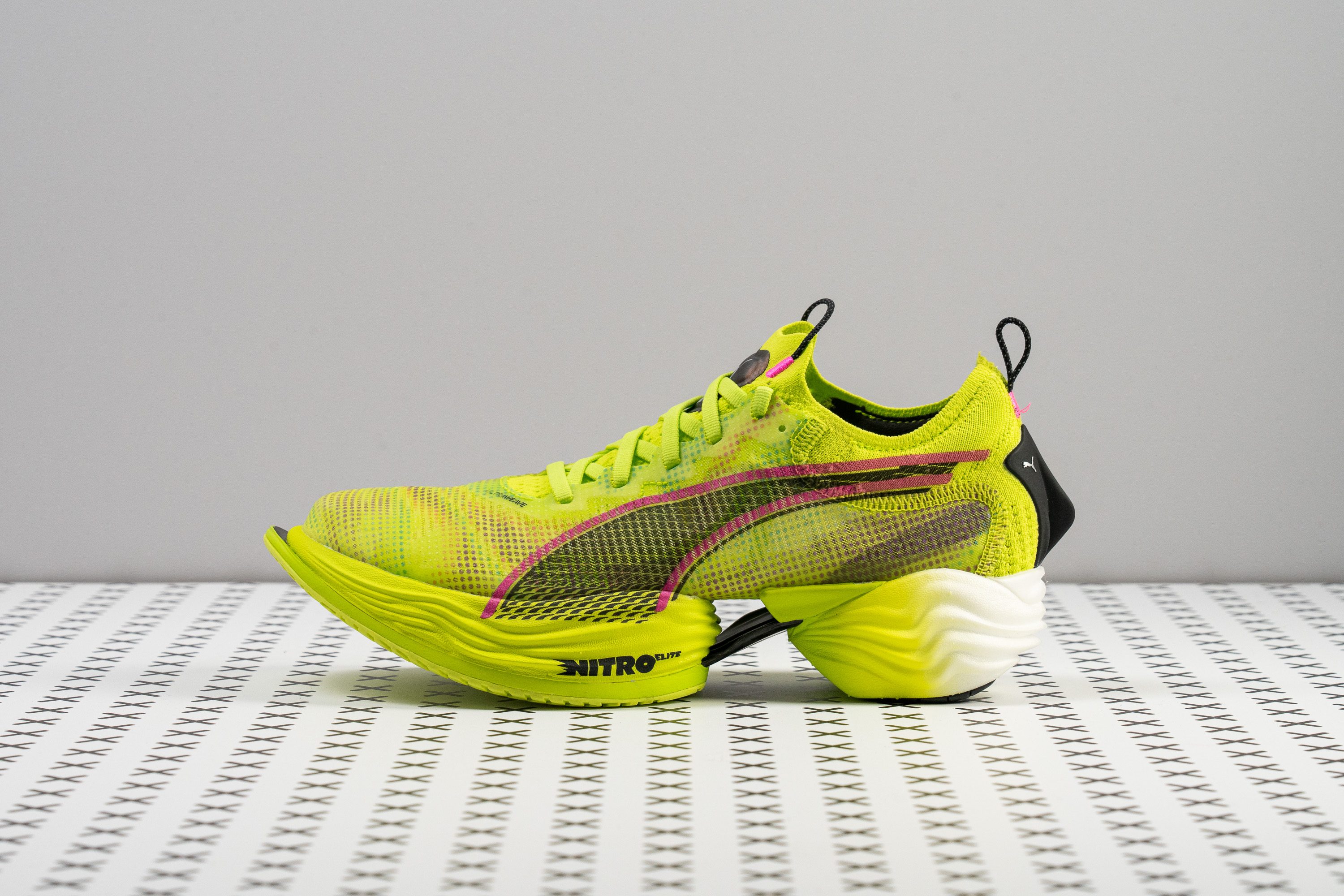
This is intended to enhance running economy, though its real-life benefits can be hard to quantify. However, what is clear is that this design is truly one of a kind.
Stability
Lateral stability test
One major concern with supershoes is often their stability, which usually takes a back seat in the final product. In our tests, the Fast-R Nitro Elite 2 offered a somewhat stable ride, performing better than some of the plushest supershoes.
However, don't anticipate a very supportive run experience. The minimal upper and the decoupled midsole don't contribute much to stability, and, true to the design and geometry of this shoe, the ride is definitely on the wild side!
Torsional rigidity
As soon as we stepped into this shoe, we were struck by its rigidity. It's absolutely mind-blowing, a stark contrast to the flexibility of something like the Merrell Vapor Glove 6. Naturally, it earned a 5/5 in our manual assessment for its steel-like rigidity.
| Puma Fast-R Nitro Elite 2 | 5 |
| Average | 3.3 |
Heel counter stiffness
Conversely, the heel counter is extremely flexible, as is typical for a racing shoe, which led us to give it a 1/5 rating.
For those requiring a more secure heel hold—and thus might prefer a more traditional running shoe while still targeting top performance—the ASICS Superblast is an excellent choice.
| Puma Fast-R Nitro Elite 2 | 1 |
| Average | 2.8 |
Midsole width in the forefoot
We've already highlighted that the design of this shoe is truly unique, leading to some intriguing findings in the lab.
One surprising discovery was that although the midsole appears exceptionally narrow, measurements showed it to be fairly standard at 114.2 mm. This demonstrates that initial feelings can sometimes be deceiving and that lab testing really matters...
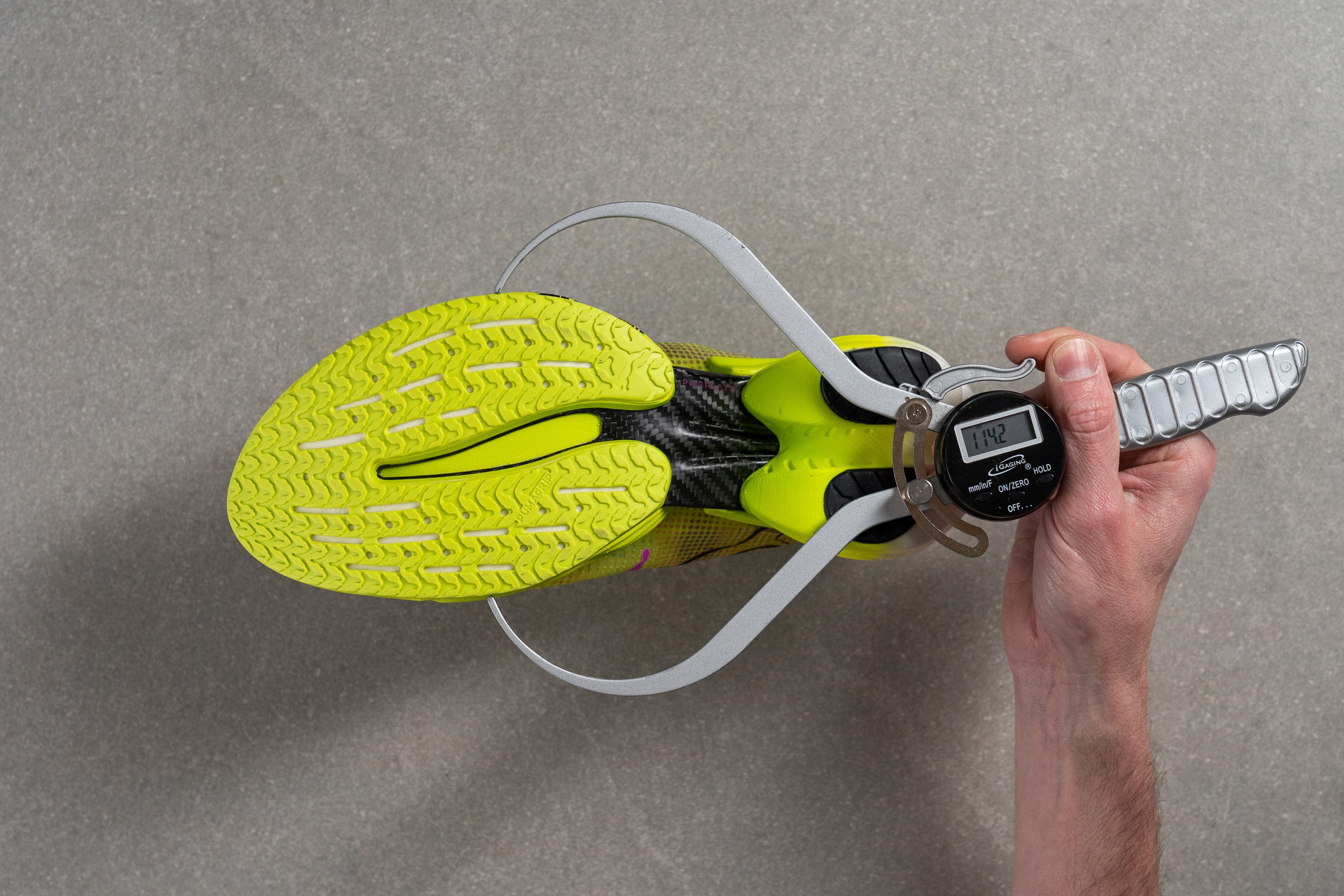
| Puma Fast-R Nitro Elite 2 | 114.2 mm |
| Average | 113.9 mm |
Midsole width in the heel
The heel also feels narrow, and indeed it's not broad at all.
Measuring just 86.6 mm, it's clear to us that those requiring stability in the heel may not enjoy a lovely ride in the Fast-R NE 2.
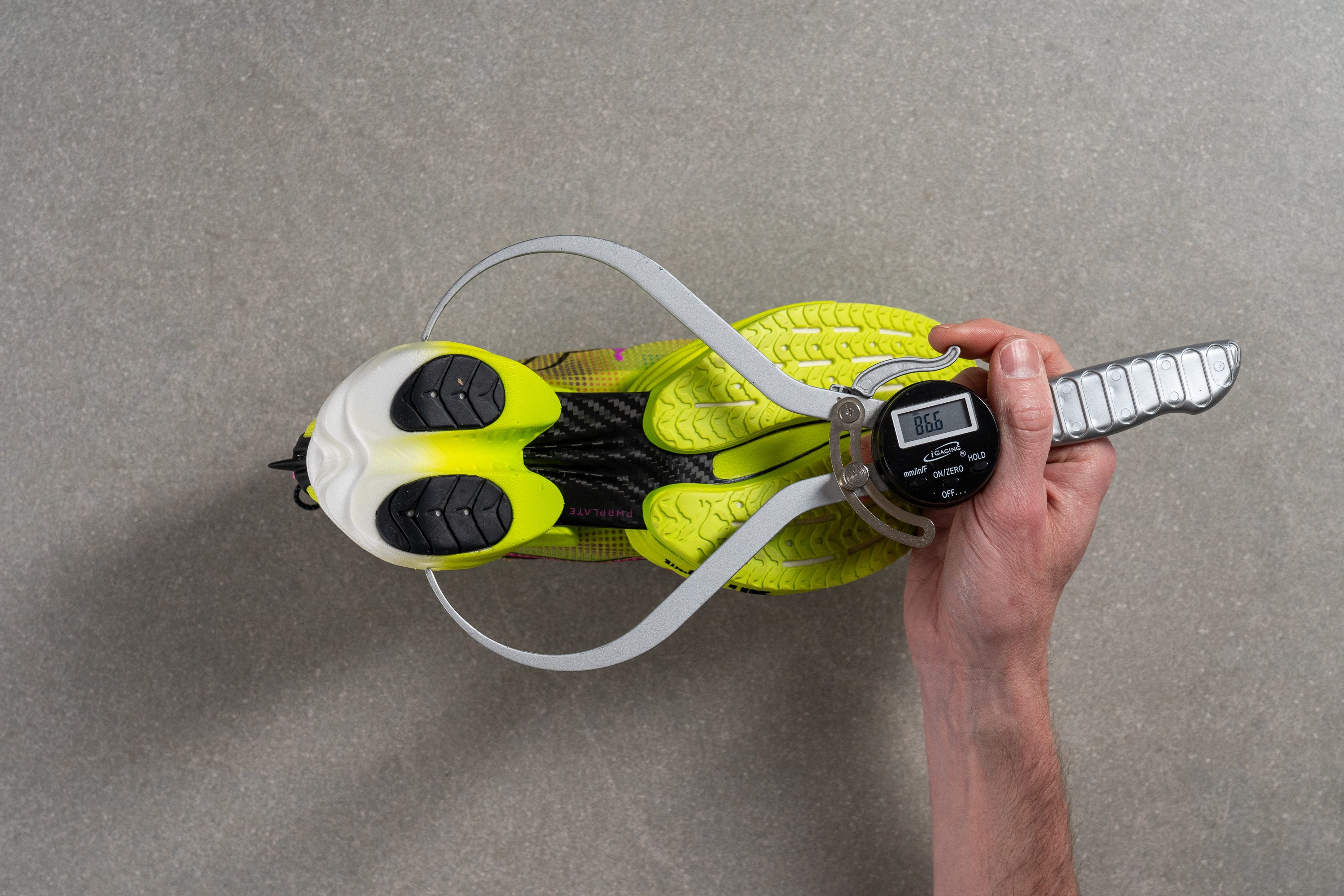
| Puma Fast-R Nitro Elite 2 | 86.6 mm |
| Average | 90.5 mm |
Flexibility
Stiffness
During our rigidity evaluation, where each shoe is bent to a 90-degree angle, the Fast-R Nitro Elite 2 displayed significant stiffness, achieving a Hulk-like force measurement of 84.4N.
Why going so stiff? Well, crafting a top super shoe typically involves a combination of resilient foam and a rigid structural plate. In this case, the lively bounce is provided by Nitro Elite A-TPU foam, and the mind-blowing rigidity is courtesy of the carbon-fiber PWRPLATE. Puma just decided to go all-in here.
| Puma Fast-R Nitro Elite 2 | 84.4N |
| Average | 28.8N |
Difference in stiffness in cold
We conducted another freezer test, placing this Puma in there for 20 more minutes, and we observed a 19.2% increase in stiffness (100.6N!). If you're planning to run a winter marathon, be prepared to handle this level of rigidity.
| Puma Fast-R Nitro Elite 2 | 19.2% |
| Average | 34.9% |
Size and fit
Toebox width at the widest part
Given its radical design, we anticipated a unique fit in the toebox. However, when we measured the widest part of the upper, it came to 96.9 mm, which aligns quite closely with the norm for racing shoes and even resembles the fit of many daily running shoes.
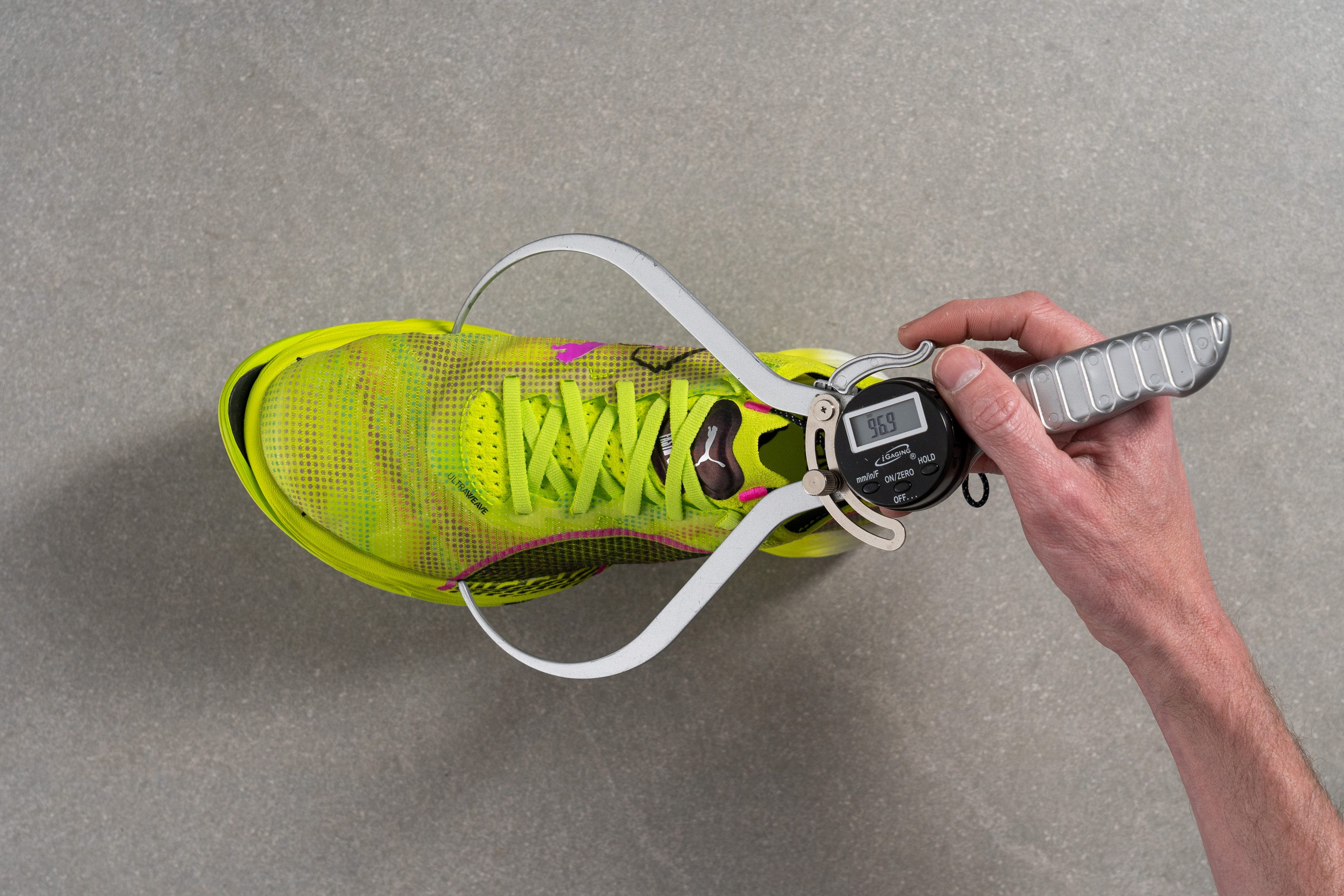
| Puma Fast-R Nitro Elite 2 | 96.9 mm |
| Average | 98.4 mm |
Toebox width at the big toe
Conversely, the big toe area fully embodies the Fast-R spirit. It is one of the most tapered designs we've encountered in the lab—a fact that's visually apparent and was confirmed with our calipers.
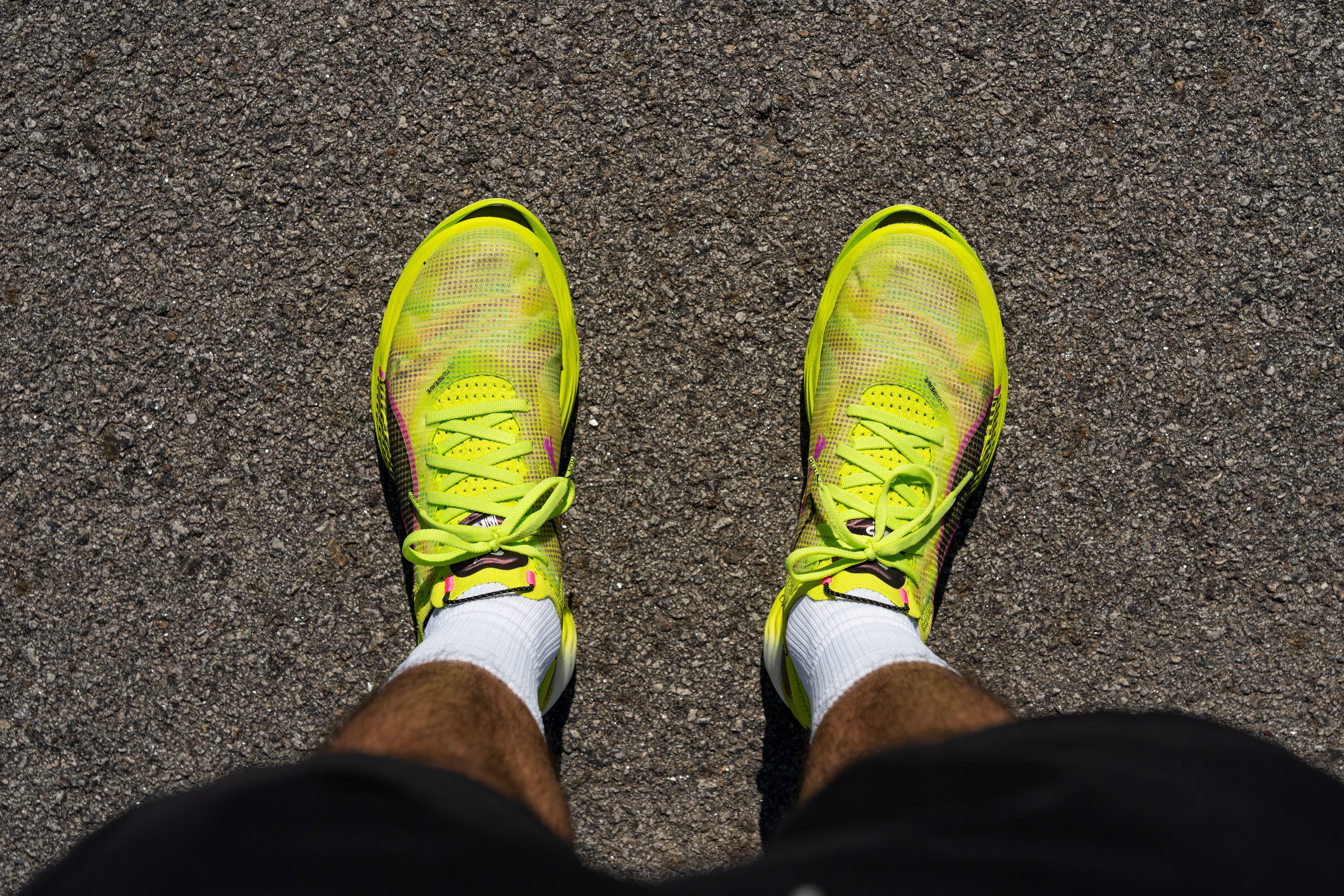
Clearly, we believe that those with square-shaped feet will find this shoe unsuitable.
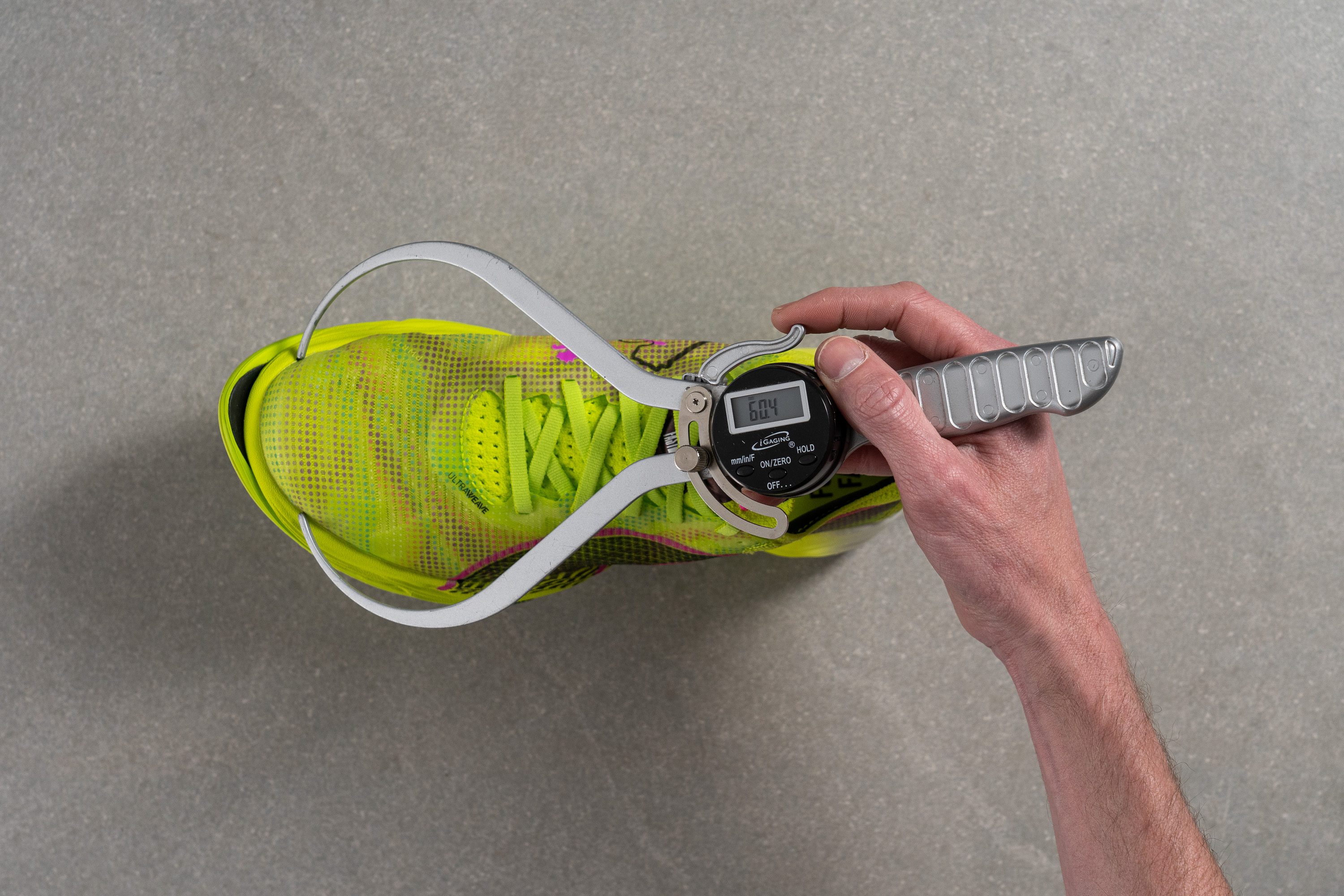
| Puma Fast-R Nitro Elite 2 | 60.4 mm |
| Average | 78.3 mm |
Tongue: gusset type
For those looking to not worry about their shoe’s tongue during a race, we believe the sock-like tongue is the way to go. It stays perfectly in place—it doesn’t shift, clings closely to the feet, and offers a tight feel.
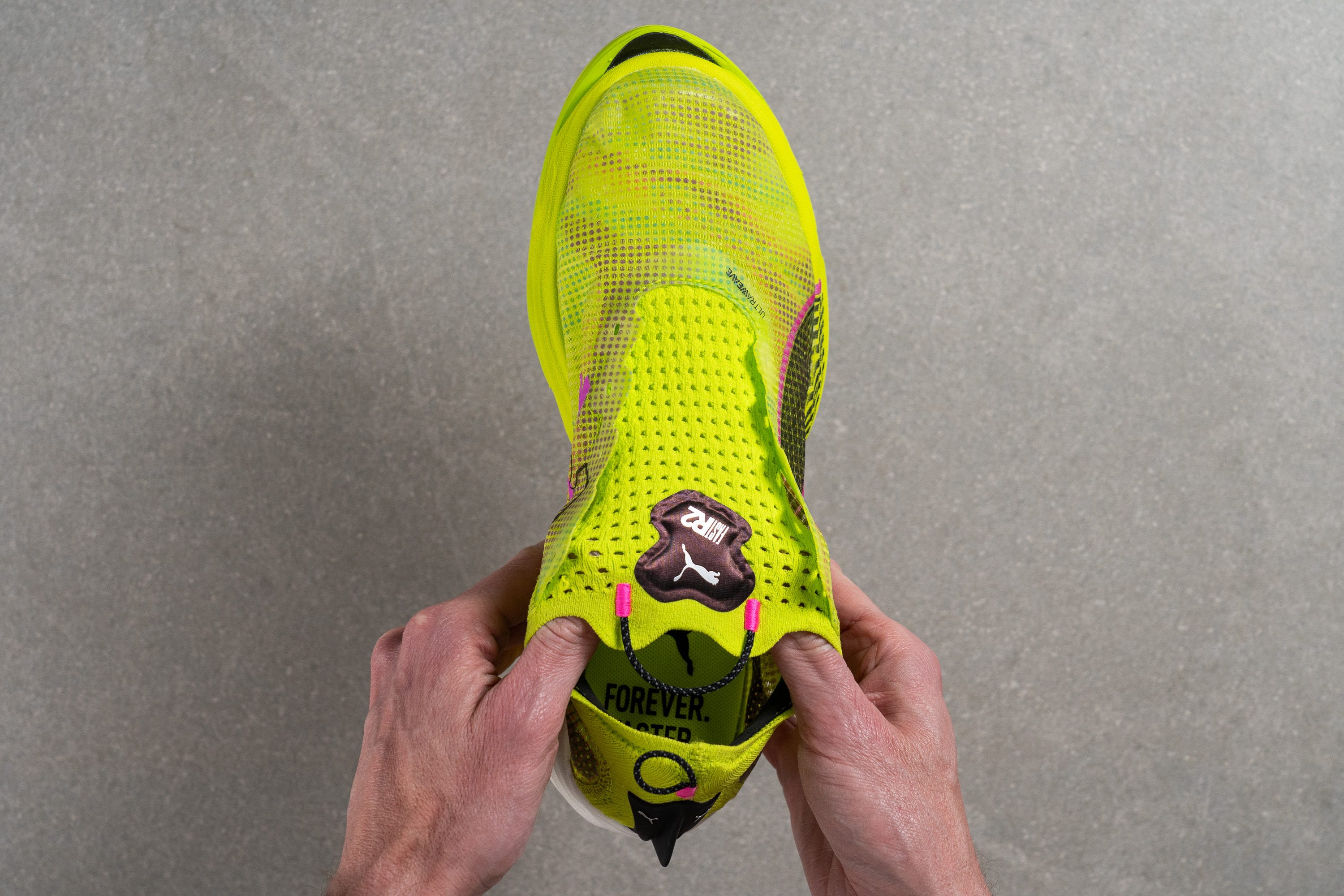
| Puma Fast-R Nitro Elite 2 | Sock like |
Comfort
Tongue padding
The tongue of the shoe is exactly what we anticipated for a proper marathon shoe—remarkably thin at just 1.3mm.
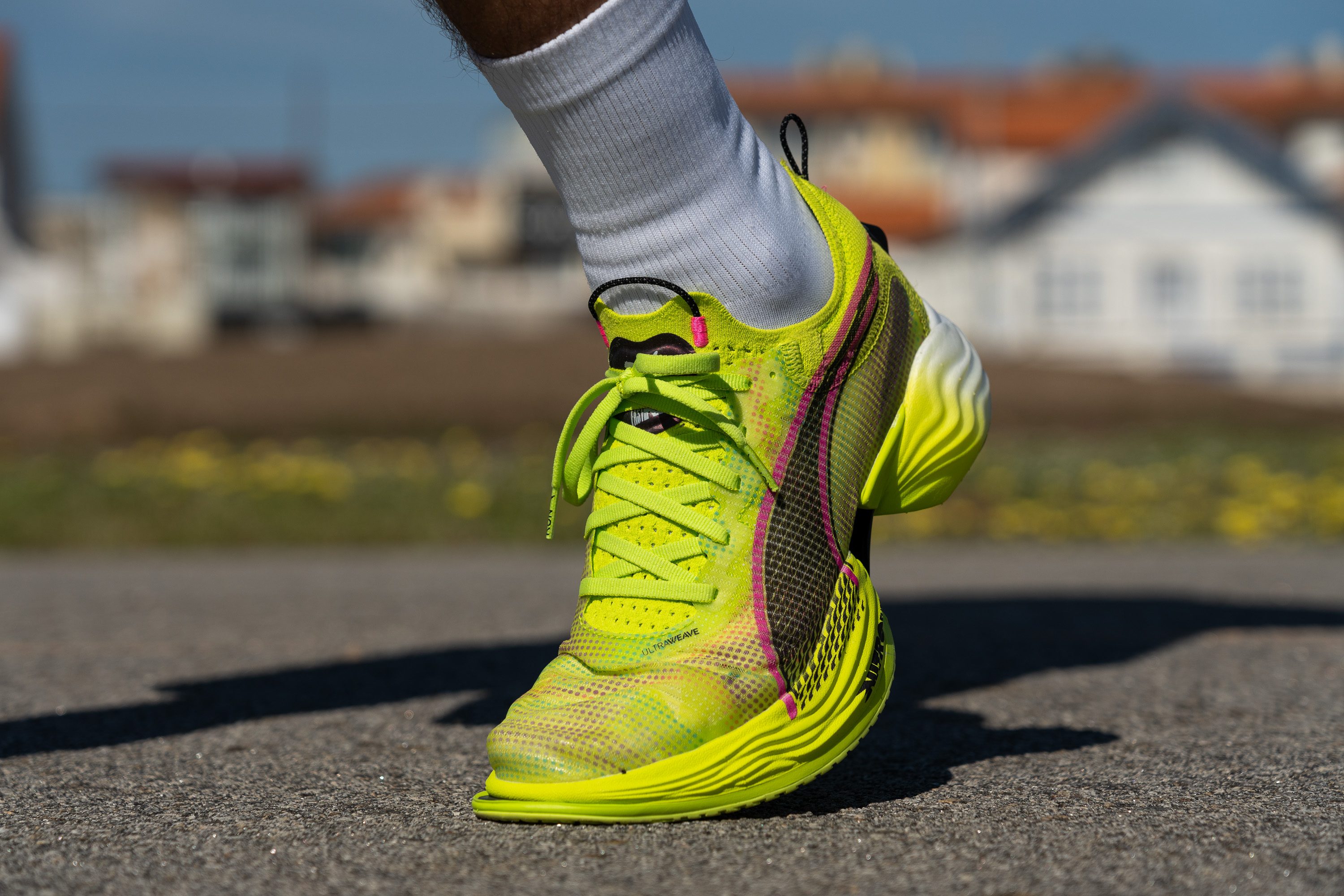
Due to this, comfort is minimal, and we advise being cautious when cinching down the laces before a marathon. Over-tightening could lead to mid-race instep pain, as we discovered during our tests.
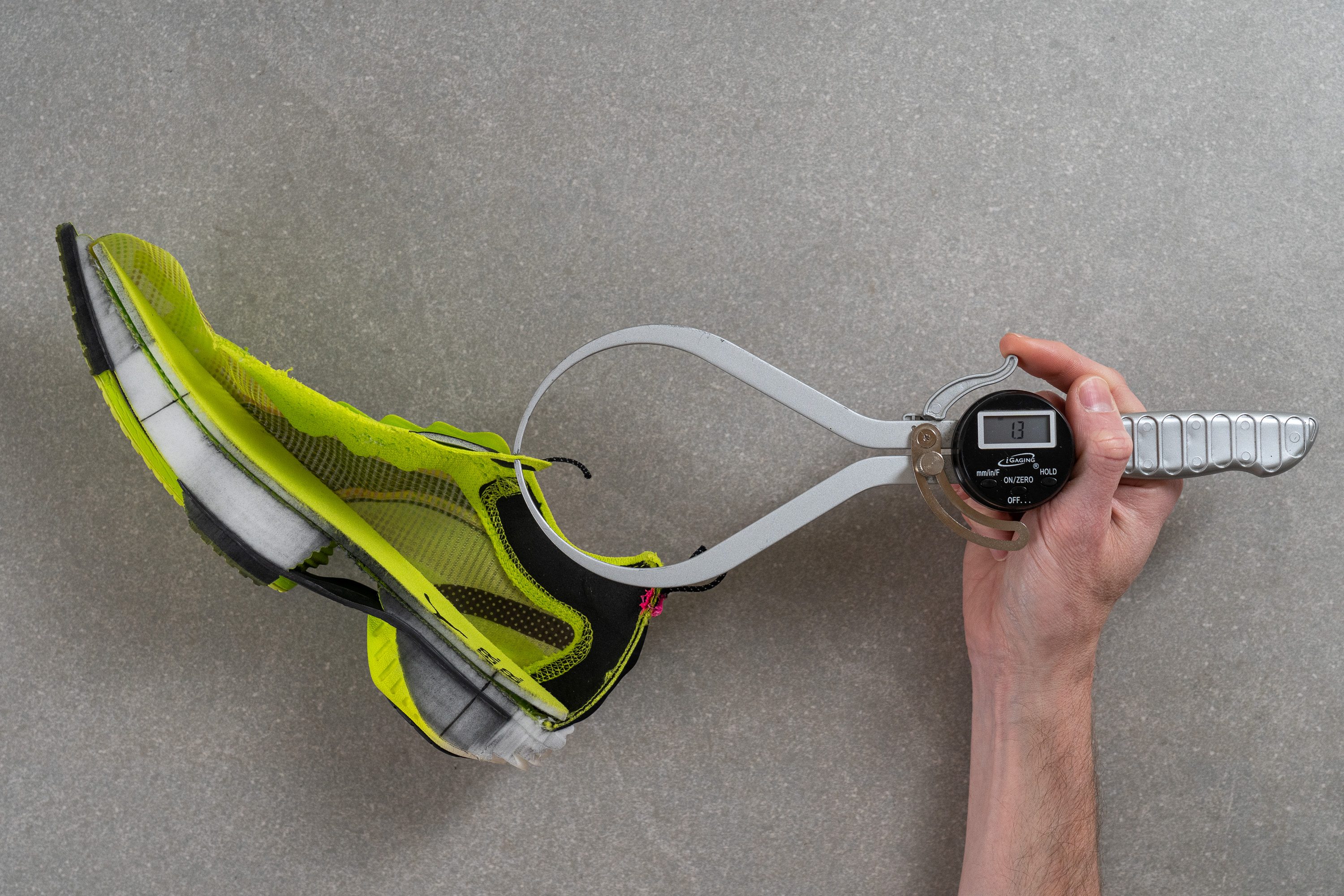
| Puma Fast-R Nitro Elite 2 | 1.3 mm |
| Average | 5.7 mm |
Heel tab
In the heel, we discovered a handy finger-loop heel tab, which is absolutely essential in any shoe featuring a sock-like upper.
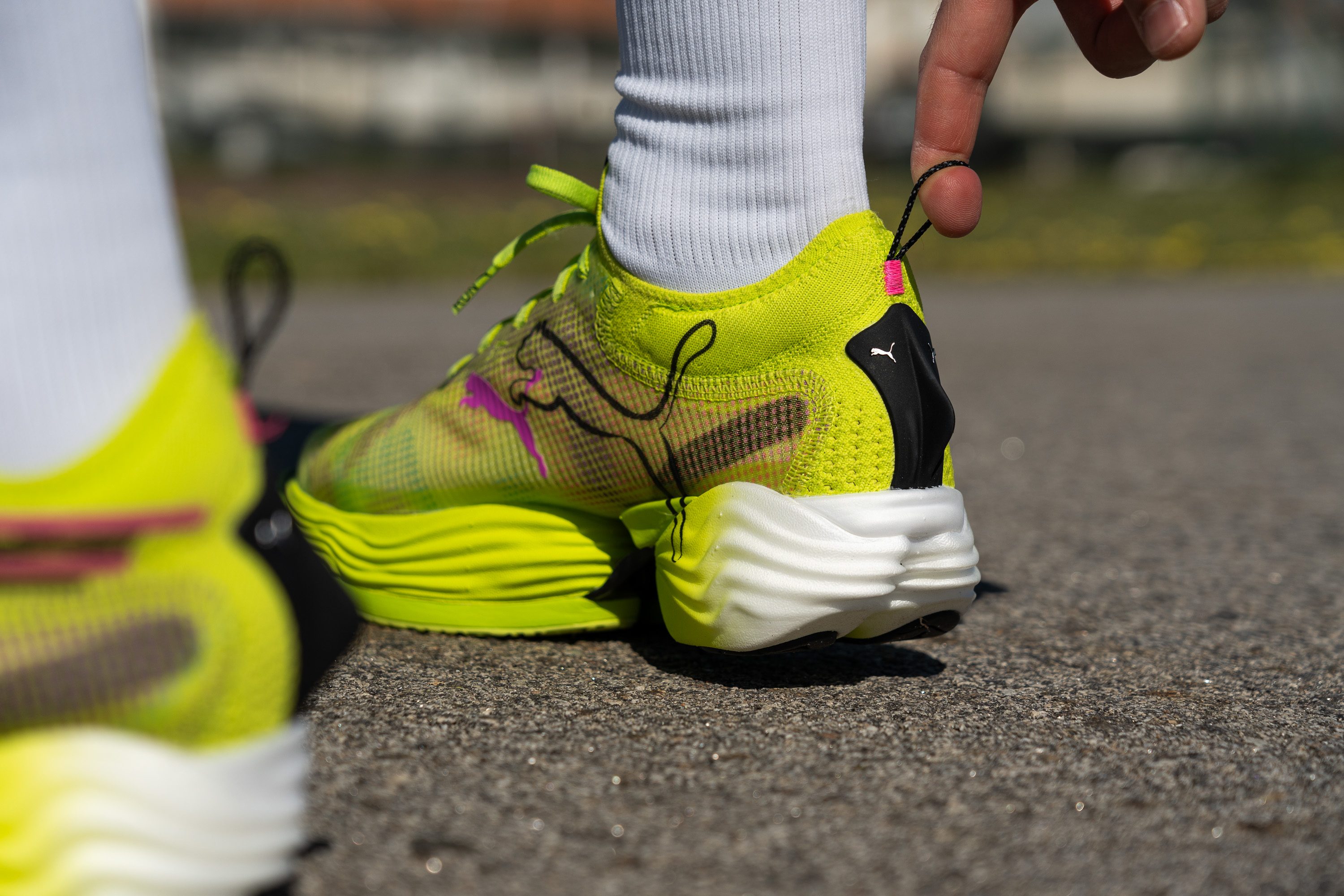
| Puma Fast-R Nitro Elite 2 | Finger loop |
Removable insole
The insole is removable, which is uncommon in competition shoes. However, as shown in our photo, the outsole's unique shape—with a protruding midfoot area—may pose some challenges when trying to replace it with a different option.
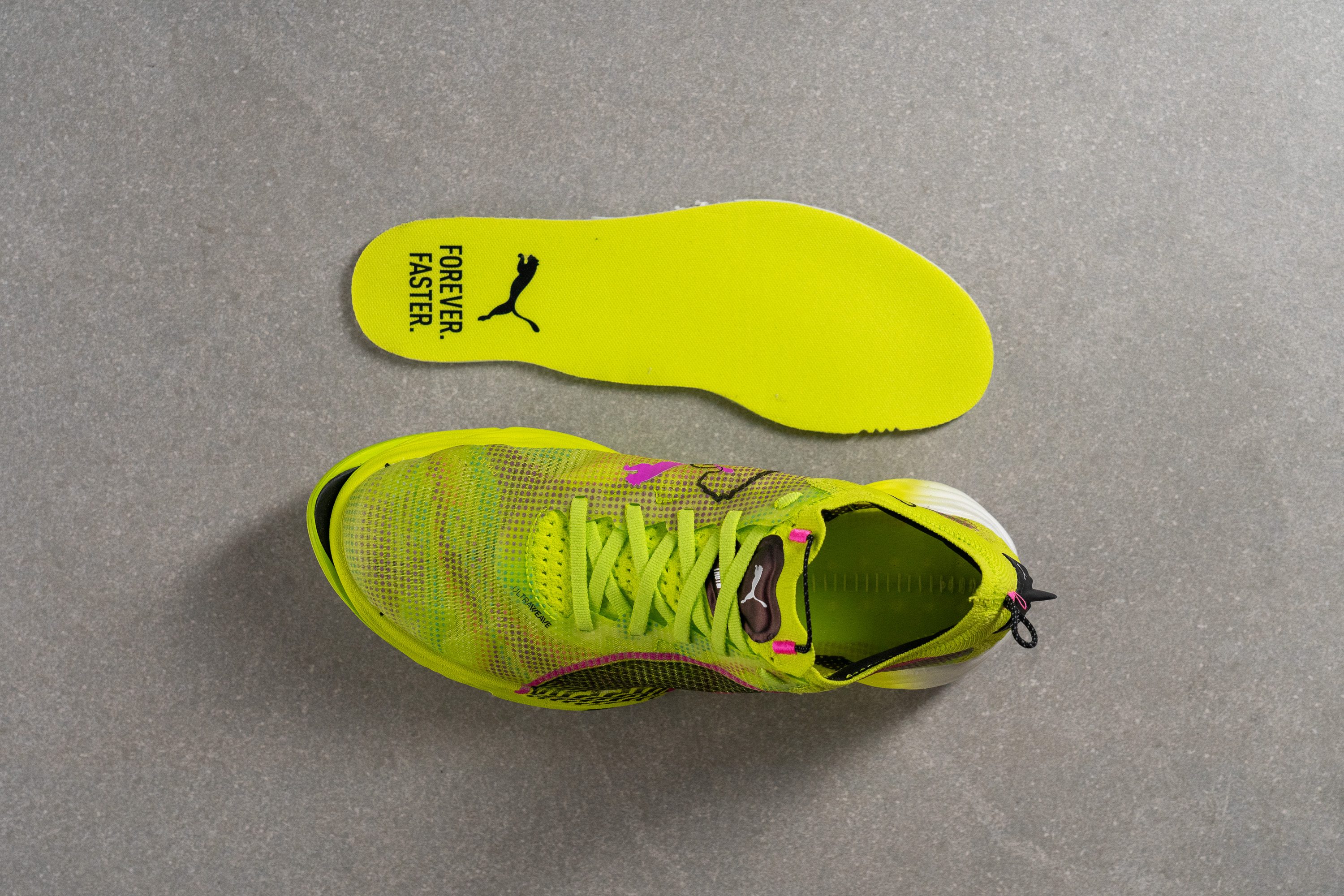
| Puma Fast-R Nitro Elite 2 | Yes |
Misc
Reflective elements
The Fast-R Nitro Elite 2 stands out as one of the few racing shoes that incorporate reflective elements—kudos to Puma for this one!
| Puma Fast-R Nitro Elite 2 | Yes |

